OCTOBER 2022





















The streets are paved with culture in Leipzig, the ghosts of history ever present. The birthplace of Liebniz, Schumann, Mendelssohn, Bach and Wagner not to mention Till Lindemann of operatic shock rockers Rammstein, that most Wagnerian of contemporary bands also hosts East Germany’s longest running independent film festival, known since 2005 as DOK Leipzig. Founded under the old Communist regime in 1955, only to be banned several times for failing to follow the party line, this long running event remains a
forum for free thinking and critical voices even today. As a platform for both documentary and animation, the festival has a strong industry and business focus, but the 65th edition also offered a lively mix of parties and premieres, sparky debates and arty sidebars.

For attendees, DOK Leipzig still retains an indie leaning, close knit, communal feel. The cosy Passage Kino cinema, tucked away in an unassuming arcade alleyway close to the city’s handsome historic centre, has long served as the main screening hub.
(Continued on page 3)
VERDICT: Theo Montoya's debut feature 'Anhell69' featuring the queer young generation in Colombia wins the International Competition at DOK Leipzig. Uplers, October 25, 2022


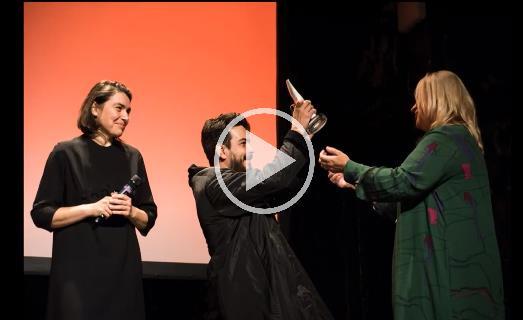



Golden Dove for International Competition Anhell69
(Directed by Theo Montoya)
Silver Dove for International Competition
(Directed by Faustine Cros)
Golden Dove for German Competition
Dead Birds Flying High (Directed by Sonje Storm)
(Continued on Page 2)
(Continued)
Golden Dove for Audience Award Three Women (Directed by Maksym Melnyk)
Silver Dove for Audience Award
Lada, Ivan’s Sister
(Directed by Olesya Shchukina)
A Hawk As Big As A Horse
(Directed by Sasha Julak)
Theo Montoya, director of Anhell69, and Bianca Oana, one of the producers of the film; Copyright: DOK Leipzig 2022 | Viktoria Conzelmann

Golden Dove for Best Documentary International Competition Will You Look At Me (Directed by Shuli Huang)
Silver Dove for German Competition Short Film Border Conversation
(Directed by Jonathan Brunner)
Silver Dove for the Best Short Documentary or Animated Film by an Up and Coming Director Persona (Directed by Sujin Moon)
(Directed by Matthias Joulaud, Lucien Roux)
Sasha Kulak (director, in the middle), Louis Beaudemont (producer, on the right) und Olga Polevikova (script doctor, on the left); Copyright: DOK Leipzig 2022 | Viktoria Conzelmann
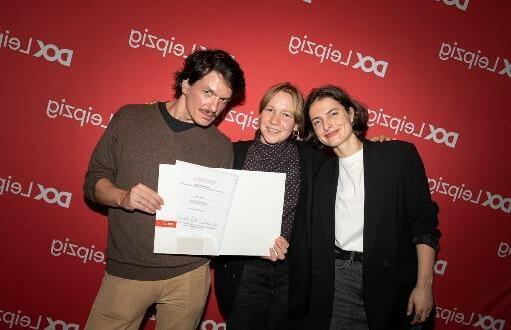
Golden Dove for Best Animation International Competition Misaligned (Directed by Marta Magnuska)
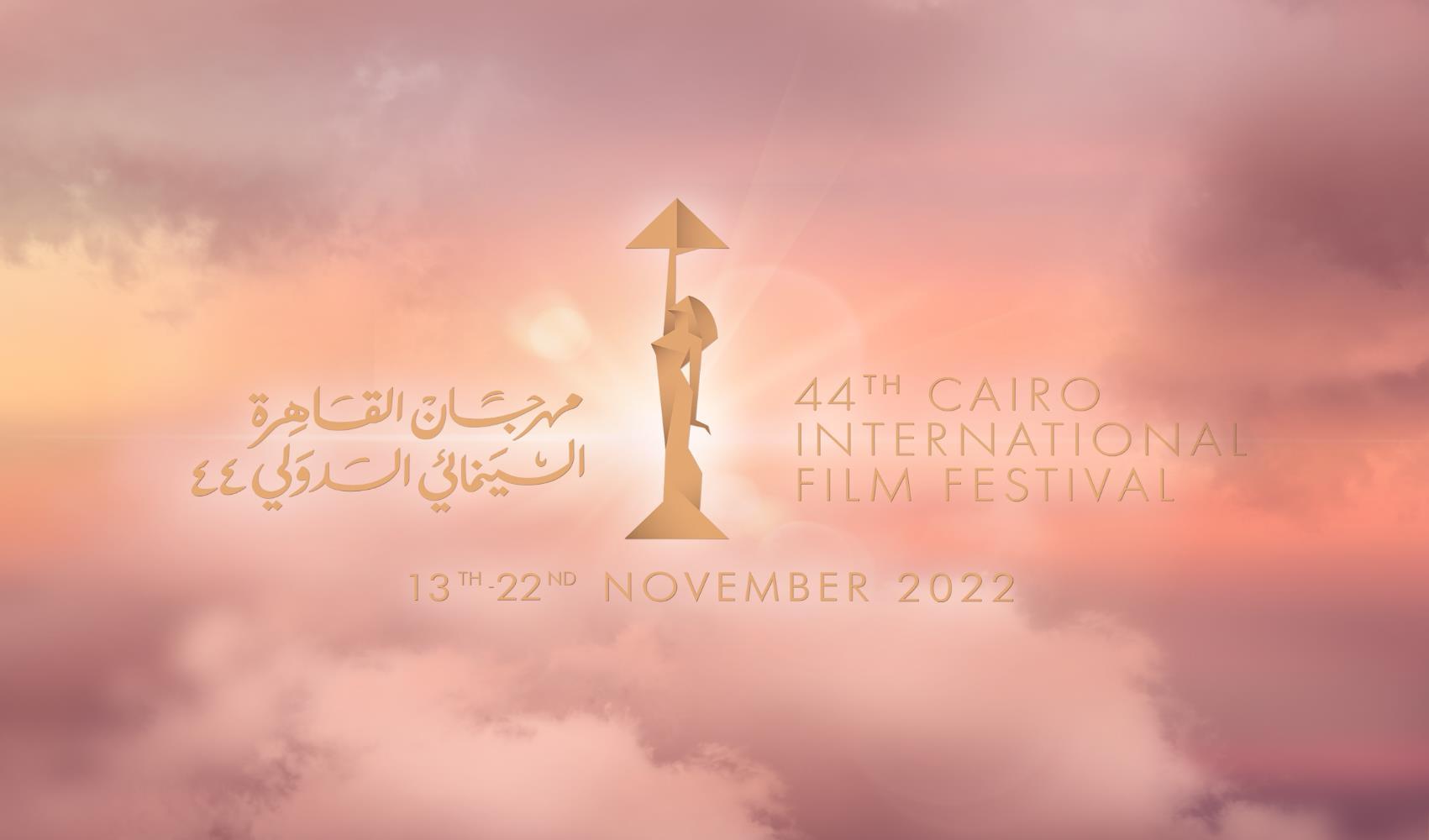
Video message of Marta Magnuska, director of MISALIGNED; Copyright: DOK Leipzig 2022 | Susann Jehnichen
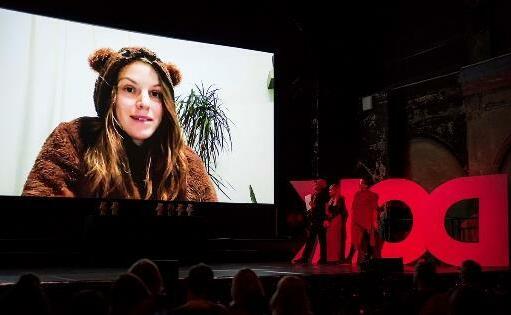

(Continued)
But the festival also enjoys financial support from both city and regional governments, which allows it to make a visible splash across a much wider urban canvas, including some of Leipzig’s grandest buildings. The main meeting lounge and more arty sidebar programs are located in the Museum of Fine Arts, a mighty modernist cathedral of glass and steel squeezed between cobbled streets and chocolate box townhouses.
Free public screenings also take place in one of the cavernous entrance foyers to Leipzig’s palatial railway station, the largest in Europe and a mini city in its own right, a gloriously surreal venue to watch films as commuters and shoppers shuffle past. The festival’s main party and prize giving events, meanwhile, mostly take place in the city’s bohemian western suburbs at the Schaubühne Lindenfels, a soulfully shabby chic music hall with an elegantly crumbling interior.
As befits a politically engaged festival that managed to outlast a repressive Communist regime, held in a city famous for peaceful street protests that signalled the first cracks in the Berlin Wall, critical angles on modern day totalitarian states were high on the agenda in this year’s program. Ukraine has featured heavily at numerous film gatherings all this year, for obvious reasons, but DOK Leipzig went the extra mile by screening a fest in exile version of DocuDays UA International Human Rights Documentary Film Festival, which was due to take place in Kyiv in March before Russia’s barbarian invasion.
small rural village in western Ukraine. In his opening statement, festival director Christoph Terhechte reaffirmed solidarity not just with Ukrainians but also with “the courageous women in Iran and all those who finally have the prospect of shaking off decades of oppression and asserting elementary human rights. DOK Leipzig, too, stands for these values.”
Getting a feel for the XR controls: a visitor of DOK Neuland exhibition “THX 4 Nothing”.
Copyright: DOK Leipzig 2022 | Viktoria Conzelmann


Ukrainian film makers and themes figured prominently in the Leipzig program, while the main Golden Dove Audience Award went to Maksym Melnyk’s Three Women, a charmingly sweet multi character study focussed on a
Queer lives under pressure was another recurring motif at DOK Leipzig this year. The main Golden Dove prize in the International Competition went to Colombian (Continued on page 4)
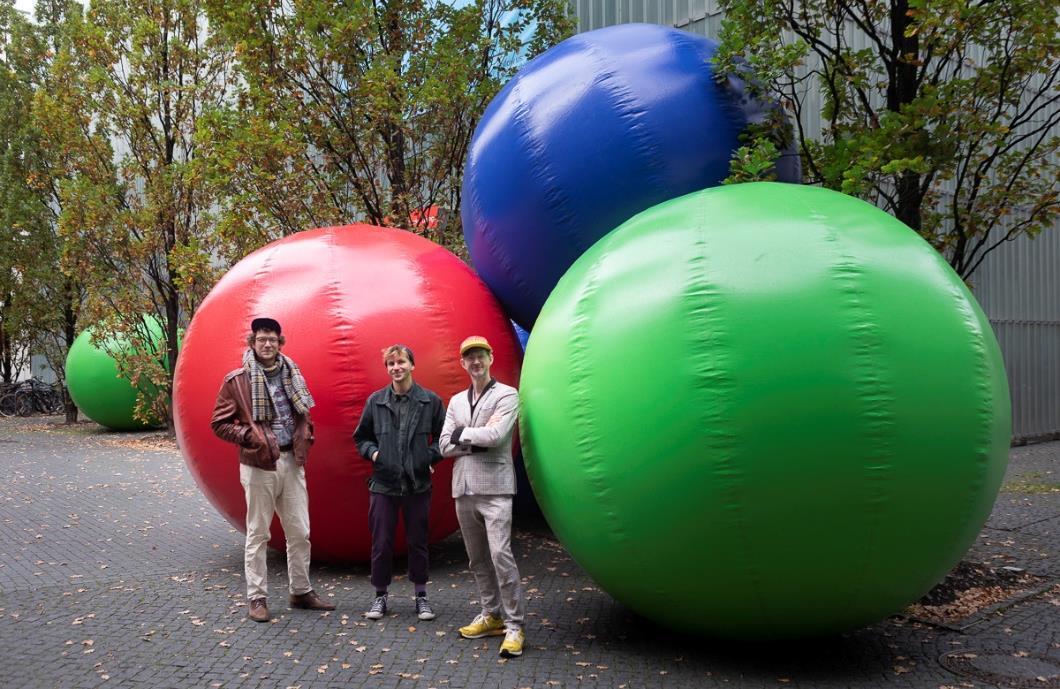
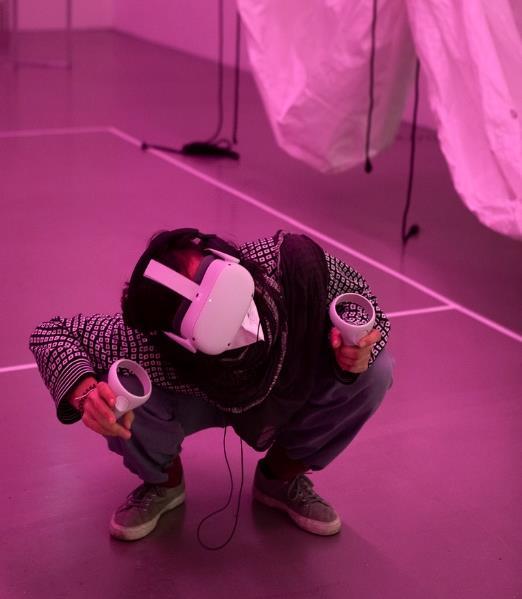
(Continued)
Theo Montoya’s meta docu drama ghost story Anhell69, a moving and original screen memorial to Medellín’s doomed outsider kids. And top prize for short documentary was awarded to Will You Look At Me by Shuli Huang, a compact but poetic vignette about the director coming out to his family.
The Silver Dove award in the International Competition was won by A Life Like Any Other by Faustine Cros, which interrogates the director’s own parental history using her father’s obsessive home video collection, subversively reclaiming her
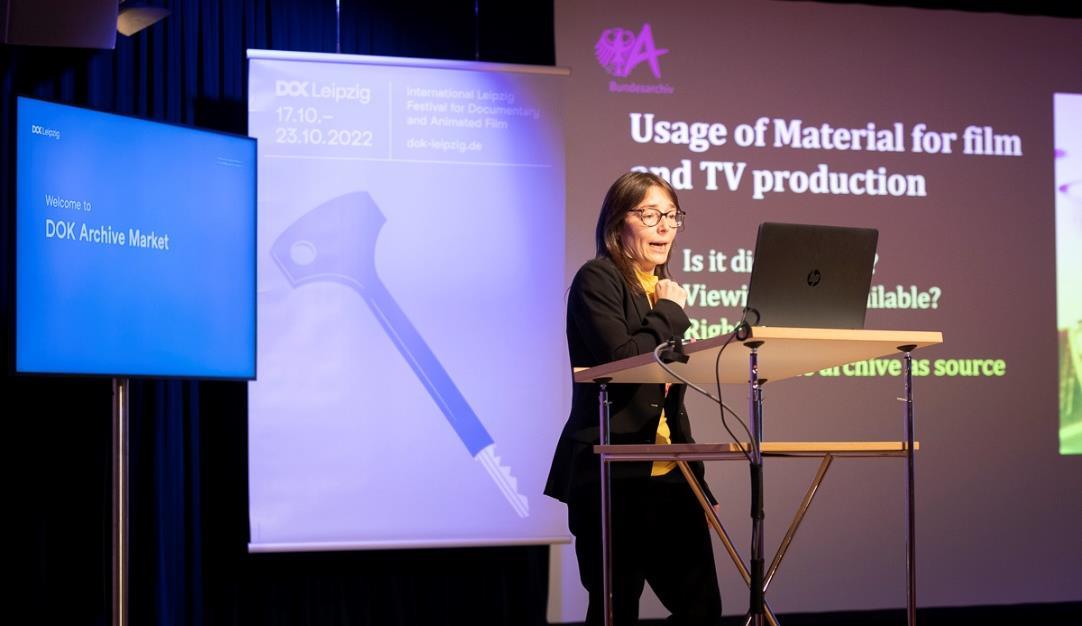
depressive mother’s untold back story from the official family narrative of sunny domestic cotentmet. This kind of critical, highly personal, archive driven film was major feature at DOK Leipzig, with world premieres like Sofia Brockenshire’s The Dependents, Mickaël Bandela’s One Mother and Brenda Akele Jorde’s The Homes We Carry All these films have their own unique stories to tell about race and class, exile and belonging, but all share a theme of children digging away at unresolved tensions with their parents using family video clips,
vintage photos and new interview material in fresh and inventive ways.


Beyond the main screening program, one of the festival’s stand out bespoke events this year was Dancing In The Dark by Hysteresis and Company, a multi media performance film project from director Robert Seidel which combined modern dance, digital graphics and live action footage projected instantaneously onto the concave rear walls of the Schaubühne Lindenfels, all set to a crackling electronic score by German composer Markus Popp, aka Oval. Hybrid happenings like these reinforced the sense of DOK Leipzig as a kind of experimental laboratory for pushing the limits of both documentary and animation to new frontiers. A small festival with deep roots and impressively grand ambitions.
Stephen Dalton

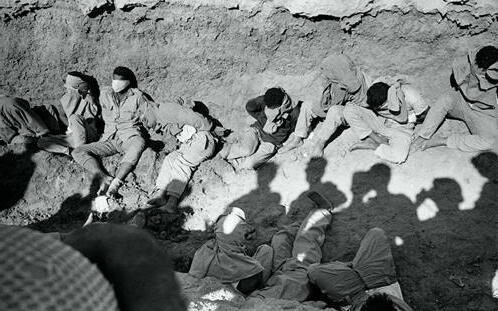
IDA received 806 total submissions in all categories, from 86 countries, 40% of which are internationally produced or co produced projects.
Geographies of Solitude
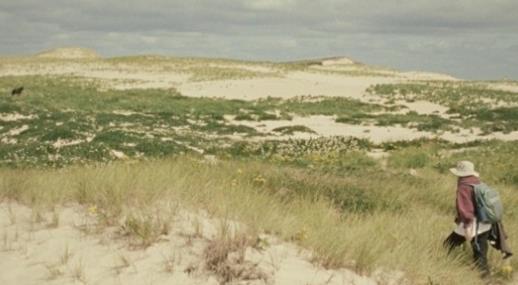
Directed by Jacquelyn Mills
Hidden Letters
Directed by Violet Feng, Qing Zhao
A House Made of Splinters Directed by Simon Lereng Wilmont
Katrina Babies
1341 Frames of Love and War
Directed by Ran Tal
After A Revolution Directed by Giovanni Buccomino
All that Breathes Directed Shaunak Sen
All the Beauty and the Bloodshed Directed Laura Poitras
Delikado
Directed by Karl Malakunas
Etilaat Roz Directed by Abbas Rezaie Delikado Directed by Karl Malakunas
Etilaat Roz Directed by Abbas Rezaie
Fire of Love Directed by Sara Dosa
Directed by Edward Buckles, Jr Lyra Directed by Alison Millar Mija Directed by Isabel Castro Moonage Daydream Directed by Brett Morgen
Three Minutes A Lengthening Directed by Bianca Stitger
Waters of Pastaza Directed by Inês T. Alves
Young Plato
Directed by Neasa Ní Chianáin, Declan McGrath
ᎤᏕᏲᏅ(What They’ve Been Taught)
Directed by Brit Hensel
And Then They Burn the Sea Directed by Majid Al Remaihi
Angola Do You Hear Us?
Voices From A Plantation Prison Directed by Cinque Northern
Navalny Directed Daniel Roher Nelly & Nadine Directed by Magnus Gertten
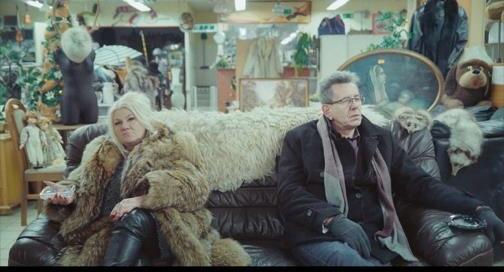
No Simple Way Home Directed by Akuol de Mabior
The Pawnshop Directed Lukasz Kowalski
Sansón and Me Directed by Rodrigo Reyes
Singing on the Rooftops Directed by Enric Ribes
A Story of Bones
Directed Joseph Curran, Dominic Aubrey de Vere
The Territory Directed by Alex Pritz
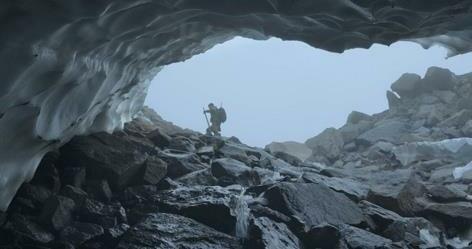
Beirut Dreams in Colour Directed by Michael Collins
The Benevolents
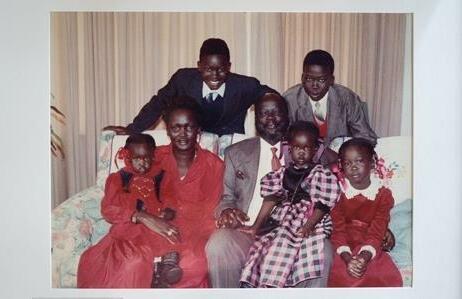
Directed by Sarah Baril Gaudet Bounty
Directed by Ben Pender Cudlip, Dawn Neptune Adams, Maulian Dana, Adam Mazo, Tracy Rector
Coming Home
Directed by Naim Naif, Margot Bowman
ROOMS by Welf Reinhart (23 min, 2021, Hochschule für Fernsehen und Film München, Merki und Reinhart Film, Student Academy Award Silver 2022)
DOOM CRUISE by Hannah Stragholz & Simon Steinhorst (17 min, 2021, Studio Corallo, German Short Film Award 2021)

ALMOST HOME by Nils Keller (30 min, 2022, Le Hof Media, Hochschule für Fernsehen und Film München, Student Academy Award Gold 2022)
AYSHA by Cengiz Akaygün (13 min, 2021, Free Monkey, Theatrical Run USA) BRAT by Anna Roller (9 min, 2022, Hochschule für Fernsehen und Film München, allergiker film, German Short Film Award 2022)

NAKAM by Andreas Kessler (33 min, 2022, Filmakademie Baden Württemberg, Cleveland International Film Festival 2022 Best Live Action Short)
PROLL! by Adrian Figueroa (30 min, 2021, Film Five, German Short Film Award 2021)
LAIKA & NEMO by Jan Gadermann & Sebastian Gadow (15 min, 2022, Filmuniversität Babelsberg KONRAD WOLF, Student Academy Award Silver 2022) PRISONER OUTSIDE by Igor Medvedev (7 min, 2021, Filmuniversität Babelsberg KONRAD WOLF, Animayo 2022 Grand Jury Award)
STEAKHOUSE by Špela Čadež (9 min, 2021, SI/DE/FR, Fabian&Fred, Anima Brussels 2022 Grand Prix & Annecy 2022 Jury Award)
ARALKUM by Daniel Asadi Faezi & Mila Zhluktenko (14 min, 2022, Visions du Réel Nyon 2022 Jury Prize for the Best Short Film)
CONSTANT by Beny Wagner & Sasha Litvintseva (40 min, 2022, CaSk Film, Guanajuato International Film Festival 2022 Best International Documentary Short)
DISJOINTED by Clara Helbig (11 min, 2021, German Short Film Award 2021)
HANDBOOK by Pavel Mozhar (26 min, 2021, DE/BY, IDFA Amsterdam 2021 Award for Best Short Documentary)
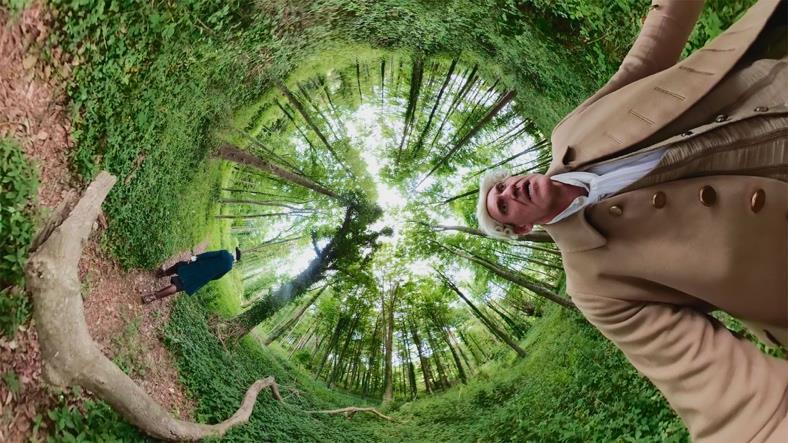




VERDICT: An intense reckoning with the trauma that violence has inflicted on a wartime generation of Ukrainians, through emotionally charged rehearsals for a theatre production.

A few months before Russia’s full scale invasion of their country began, a group of five young Ukrainian men and women, not all of whom were professional actors, collaboratively developed a theatrical production. They examined their experiences of armed conflict and persecution against the backdrop of the Maidan uprising of 2013 and the onset of war in the country’s East. The motifs of Shakespeare’s tragedy Hamlet (and German playwright Heiner Mueller’s postmodern riff on it, Hamlet Machine) provided a loose, thematic framework for the production, H Effect. Full Review
The Film Verdict: This year’s edition of DOK Leipzig is the 65th. How does the festival stay relevant and current, while also remaining true to its roots?
Christoph Terhechte: Well, I’ve only been doing this for three years, so I don’t have the burden of the festival’s whole history, although I think it’s important to respect it. You can’t just reinvent the whole thing every time you change the artistic director. One thing I wanted to do was to shorten the line up, which ended up happening anyway because my first edition was in 2020, in the middle of the pandemic. That helped us realize what the core of the festival is, and we can build upon that. The main thing

I’ve added is the Camera Lucida section, which is the showcase for experimental films. This year we also added the Panorama, with five films from Central and Eastern Europe. And for next year we’re working on something I’ve wanted to do since my first edition, which is a competition for feature length animation. We’re not just a documentary festival, but an animation festival as well. We’re highlighting it this year by opening with an animated film.

TFV: Documentary and animation are two narrative forms that often get mislabeled as genres. Does a festival like yours help clear up the misconception? (Continued)

Terhechte: Yes, of course. It’s up to the audience to draw their own conclusions, but yes, they are not genres, and I think combining them is useful. We’ve seen documentaries that use animation to show the unshowable, and our opening film, No Dogs or Italians Allowed, is animated but deals with the director’s grandparents, and we see his hands throughout the movie.
TFV: We recently got the news of what’s going on in culture circles in Scotland, with the Edinburgh Film Festival shutting down. Do you think there’s room for improvement in making sure the festival scene stays alive?
Terhechte: Well, our main financers are the city of Leipzig and the State of Saxony, and they’re both firmly behind us, so
I don’t see an immediate danger for us specifically. But yes, the pandemic has affected all of us, by driving audiences away, and I hope we can bring them back. The other big problem, going forward, is inflation, as a side effect of Russia’s war against Ukraine. I’m already thinking about how to cut costs, so we don’t go over budget next year.
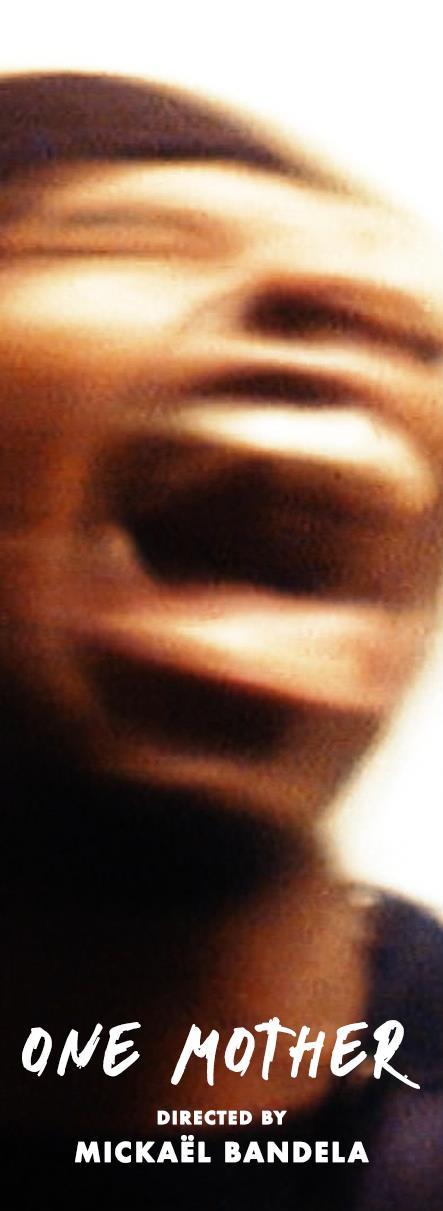





TFV: Speaking of Russia and Ukraine, the war has sparked a new wave of misinformation on both ends. In this age of fake news and “alternative facts”, how important is it to have a festival devoted to the cinema of the real?
Terhechte: Extremely. I actually think we’re essential in teaching people how to read images. We always have to question what we’re seeing. Our program partially deals with this, we have films about the creation of avatars, and the ethical discussions that come with it. And there’s a film from Argentina, Danube, where documentary footage is used to create a fictional story. Our job is not just to show people what’s wrong with the world, but to help them question the medium itself.
Interview conducted by TFV’s Max Borg




the shore in the film’s opening shot, she watches the wind whipping across the beach, parting the spiky littoral grass. She watches as Lucas trudges dusted in snow across the island, scanning the horizon with her binoculars.
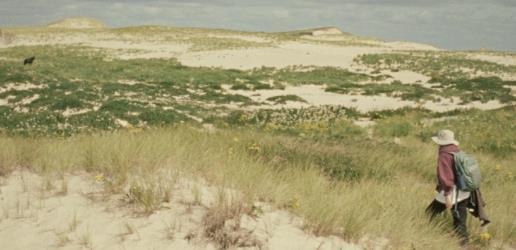
VERDICT: This warm and inquisitive documentary is both a portrait of activist and self taught scientist and the spit of land she’s called home for forty years. Ben Nicholson, October 17, 2022


Sable Island is a spit of land in the Atlantic Ocean which measures around 20 miles by one mile wide and lies approximately 100 miles off the coast of Nova Scotia. Perennially windswept, it is home to a phalanx of slightly shaggy wild horses and to artist, activist, and self taught scientist Zoe Lucas, who moved there most than four decades ago. She originally came to the island to see the horses and ended up never leaving. Screening in DOK Leipzig festival later this week, Jacquelyn Mills’ observational and thoughtful documentary Geographies of Solitude seeks to capture the island that Lucas fell in love with while, perhaps surreptitiously, also creating a
portrait of its sole human inhabitant.
“It’s so compelling being in a place where you’re learning things directly rather than reading them in a book,” explains Lucas at one point and Mills seems to take this to heart as a recommendation. Although there are various moments in the film in which Lucas relates what she is doing, or had done, in an informational way, the film stays far from inundating the audience with scientific data even if that is precisely what is being worked on by its protagonist. Instead, Mills watches through her 16mm camera.
She watches the waves lapping at
It is a sensory experience in which Mills attempts to give us the same opportunity as Lucas, to discover Sable for ourselves, although this is always from Mills’ own inquisitive perspective. The grain of the celluloid makes even the least appealing vistas look somehow luminous an overcast day on a dull, blustery beach glows with life and possibility. Perhaps even more so because we grow accustomed to seeing the island with a tinge of Lucas’ own enduring wonder. Much of the cinematography is exceptionally handsome, though, not least when Mills captures the island’s equine residents (their population has grown from 150 to over 500 in Lucas’ tenure) either plodding through thick fog or framed in silhouette against a beautiful dusky sky.
Mills intersperses this quiet observation with a series of experiments in which she exposes and develops celluloid using a variety of natural processes.

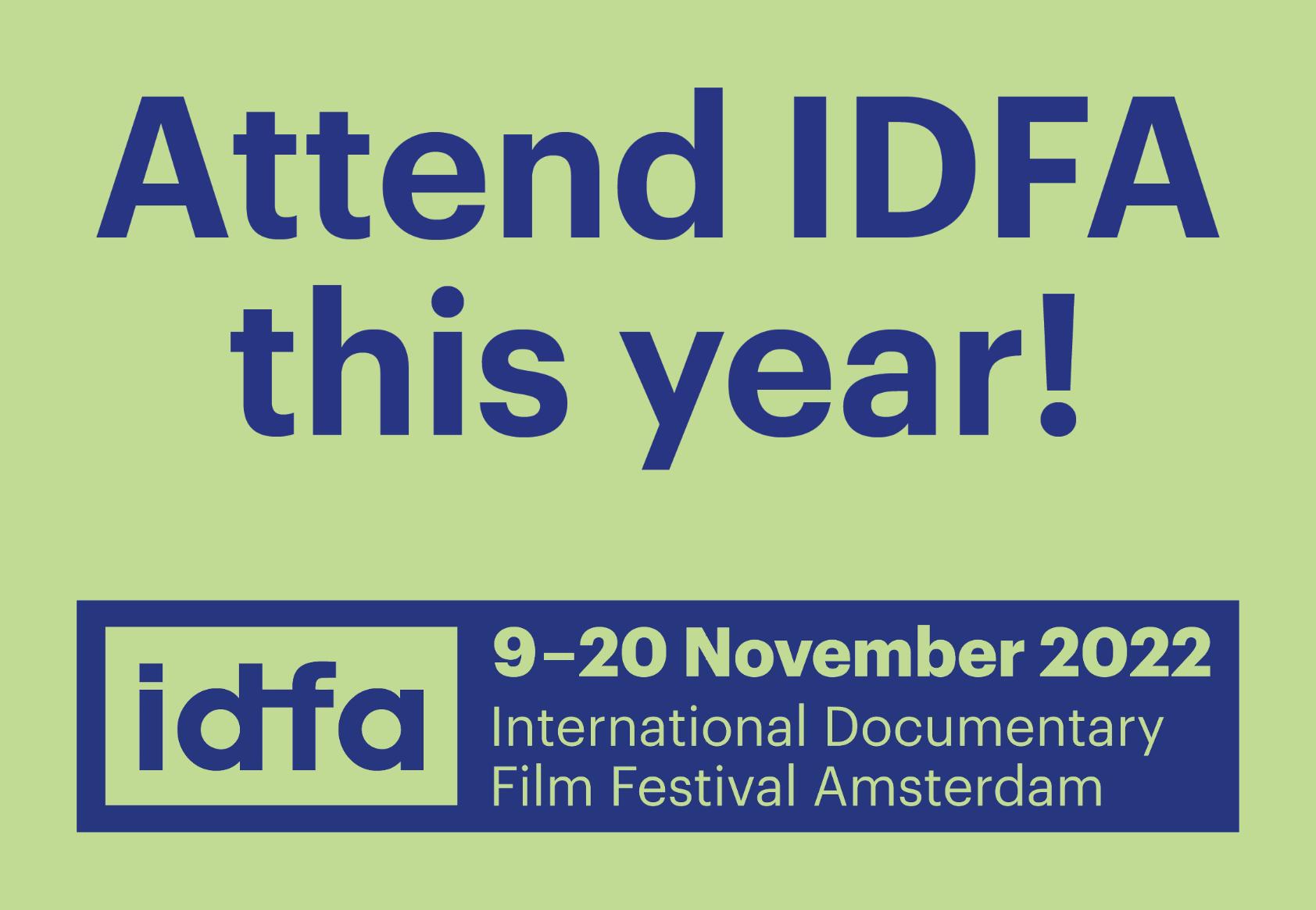





The intertwined small town stories she gathers here are low on drama but rich in emotion, humour, eccentric characters and admirable stoicism against the odds. Positive word of mouth buzz, including the Audience Award at Sheffield Doc Fest in June, plus an executive producer credit for Oscar winning screenwriter Simon Beaufoy (The Full Monty, Slumdog Millionaire) should help this unashamedly low key charmer reach a wider public following. It screens at Dok Liepzig festival later this week before opening on UK and Irish screens November 11.
VERDICT: In her prize winning documentary, director Kim Hopkins finds hope, humour and heart warming humanity at a struggling amateur film making club in northern England. Stephen Dalton, October 17, 2022
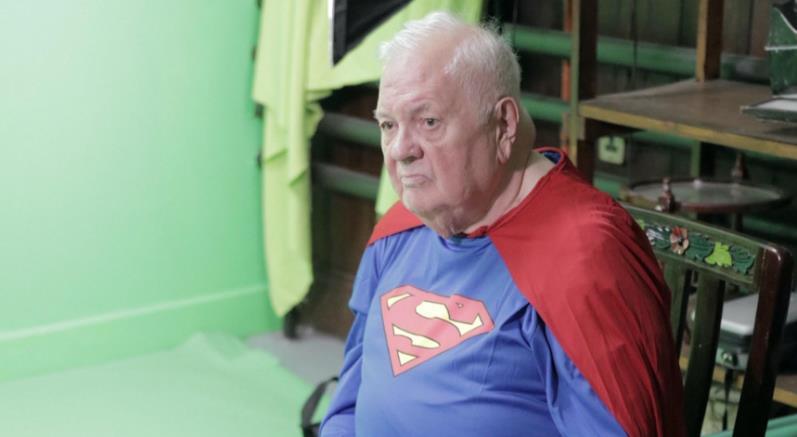
An emphatically small story with a big heart, A Bunch of Amateurs is a touching documentary about films, friendship and the fragile bonds beween them. Director Kim Hopkins spent months in old school cine verite mode, observing the weekly gatherings of Bradford Movie Makers in the northern English city of Bradford, the oldest amateur film club in Britain.
Bradford Movie Makers club was founded in 1932 and, like most of its elderly members, has seen better days. A Bunch of Amateurs begins with a warm, sunny, nostalgic montage reeling through the group’s post war glory year of big audiences and glitzy awards ceremonies. When Hopkins jumps to the present day, the contrast could hardly be starker: dwindling membership, mounting debts, and a dilapidated building that frequently falls victim to vandalism and burglary. With years of unpaid rent behind them, and substantial work required to even make their crumbling clubhouse habitable, the group seem to be facing a bleak future. Full Review
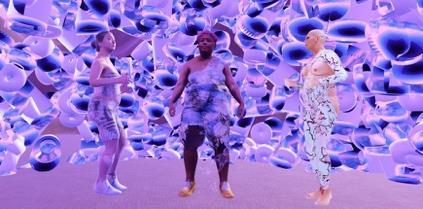 By Anna Fries, Malu Peeters
By Anna Fries, Malu Peeters
October 18 23 Experience 9 XR Works




The stereotypical idea of pregnancy is a challenge for persons who do not define themselves as female only. This auto theoretical essay explores the future of the family and non binary reproduction scenarios in which all bodies can become pregnant.
 By Mélanie Courtinat
By Mélanie Courtinat
The LGBTQIA2S+ community in Russia is facing an increasingly hostile social climate, is tabooed and criminalised. The AR experience opens a digital safe space for the local drag scene where they can perform without fear of violence.


The carelessness of Western consumer society follows the absurd conviction that humans can live independently of nature. The earth’s resources are being used up without asking how they can be replenished.
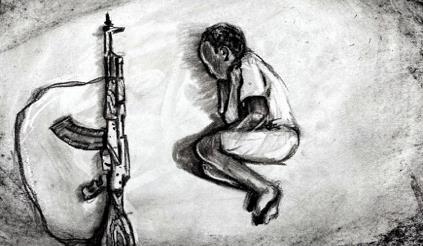
In the middle of a deserted city of concrete and fog, text fragments float over a sea of flowers. This is the story of a woman who refused to leave her home after a disaster.
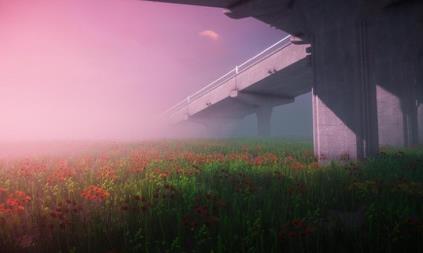
We find ourselves in the middle of a gay sauna. In search of physical contact outside ideas of bourgeois romantic love, we are part of a group sex scene.

Our everyday digital life is unthinkable without smartphones. Across the world, more than five billion such devices are in circulation. Each one of those is even touched more than 2,600 times per day.
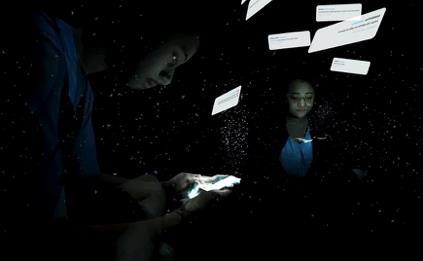
By Mike Brett, Steve Jamison, Pierre Zandrowicz, Arnaud Colinart


The Western culture of self optimisation is based on the idea that one can control all aspects of life. This VR experience subjects us to a psychological experiment, confronting us with feelings
States can annihilate each other completely with their arsenals. 1.4 million people in Hawaii got a taste of this.
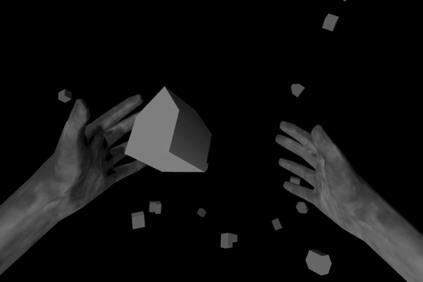
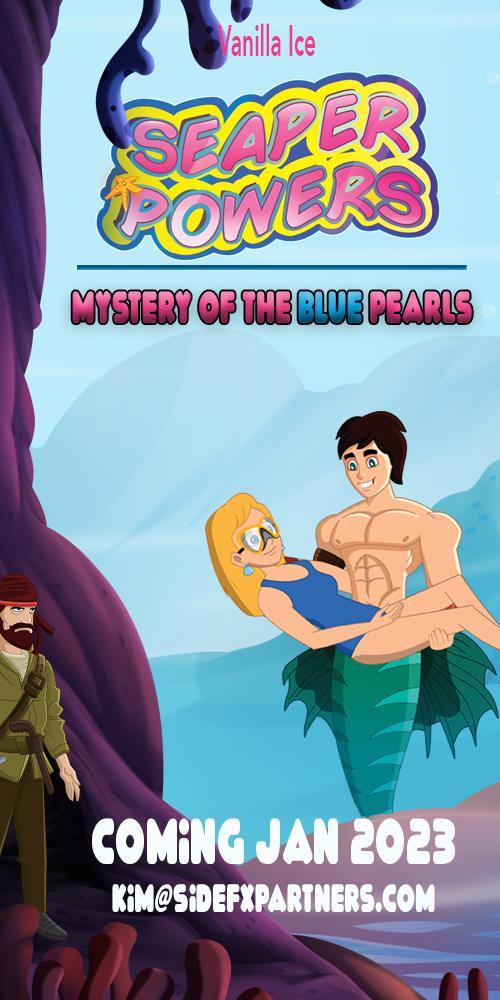
VERDICT: The Covid ward of a hospital in a town in western Bulgaria is the subject of this clear eyed observational documentary about the perseverance of both its staff and patients.
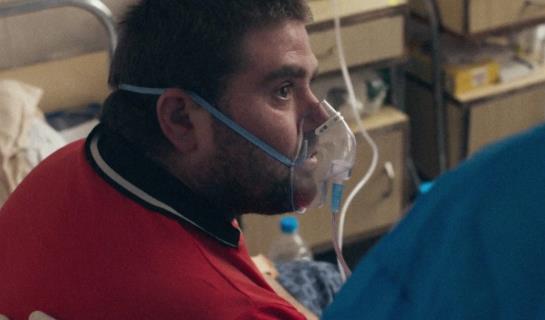
Ben Nicholson, July 6, 2022





“People come, people die. Non stop.” This is the basic fact that underscores all of the various nuances in A Provincial Hospital, the new observational documentary from Ilian Metev (Sofia’s Last Ambulance), Ivan Chertov, and Zlatina Teneva. Reminiscent in certain moments of Frederick Wiseman’s institutional portraits, this is a more actively humanistic piece that details the daily goings on in the Covid ward of a hospital serving 50,000 inhabitants of western Bulgaria. Overworked and under resourced, the tireless medical professionals are clearly the primary interest of the filmmakers, as well as the growing frustration and desperation of people struggling to pull through at the height of the pandemic.
The crux of the filmed material presents snapshots of life on the ward, both good and bad. Nurses make their morning rounds and check in with their current charges, taking temperatures, administering medicine, attempting to corral the unruly ones who don’t want to wear their oxygen masks or insist on going home. Full Review
should inject more than $128 million into the Australian economy.
What shall I shoot in Tokyo? wins award
Tokyo Film Commission’s promotional film "What Shall I Shoot in Tokyo?" won “the Gold in Tourism Products / Promotional Films of Film Commissions" at Terres Travel Festival 2022. This film is aimed to attract overseas filmmakers shooting films in Tokyo.
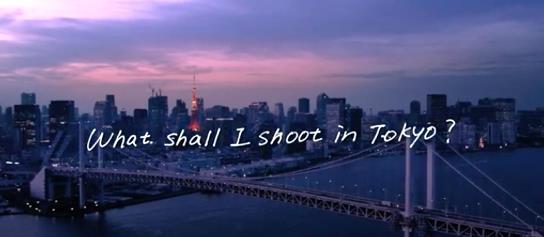
Terres Travel Festival is a tourism film festival held annually in Tortosa, Spain.
Steve Asbell, President of 20th Century Studios said “Planet of the Apes is one of the most iconic and storied science fiction franchises in film history, as well as being an indelible part of our studio’s legacy. With Kingdom of the Planet of the Apes we are privileged to continue the series tradition of imaginative, thought provoking cinema, and can’t wait to share Wes’ extraordinary vision for this new chapter with audiences in 2024.



Principal photography is underway on the new feature film One Winter starring Julian Dennison, Minnie Driver, Rhys Darby James and Erana James.

Written by Hamish Bennett & Sonia Whiteman, and directed by Paul Middleditch & Hamish Bennett, this coming of age story is set in Aotearoa New Zealand in 1981 when the arrival of the South African rugby team sets off nationwide protests against apartheid and racism.



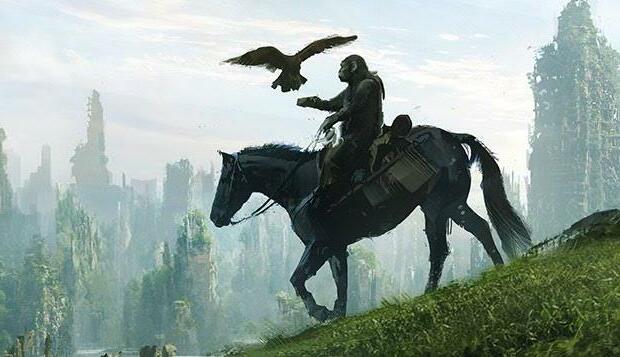
20th Century Studios’ Kingdom of the Planet of the Apes will receive $17 million in support from the Australian Government, and funding through Screen NSW’s Made in NSW Fund.
Directed by Wes Ball, The project
The first ever German adaptation of Erich Maria Remarque’s novel All Quiet on the Western Front was filmed in 2021. The Czech crew built a battlefield the size of 2 football fields, and Sirena Film successfully kept to the budget even under unexpectedly difficult pandemic conditions.
The result is the cinematic form of one of the most critical accounts of the war, now in the running for the Oscar.
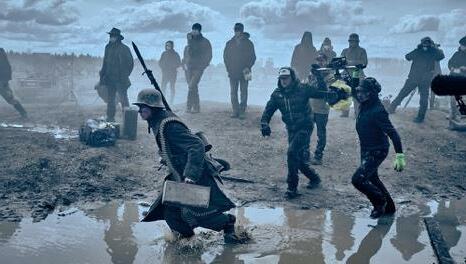
One Winter is currently shooting across Tāmaki Makaurau Auckland and Ōtepoti Dunedin with a wealth of local creatives and crew.
One Winter was made with investment from Te Tumu Whakaata Taonga New Zealand Film Commission, the New Zealand Government’s Screen Production Grant, with financing from Kiwibank.
Blue Fox Entertainment are the international sales agents with Kismet distributingthe film across Australia and New Zealand.



started families with them, leaving behind children who they would not see again until years later.
VERDICT: Afro German documentary director Brenda Akele Jorde's debut feature is a touching family saga of love and loss, historic betrayal and mixed cultural identity. Stephen Dalton, October 18, 2022
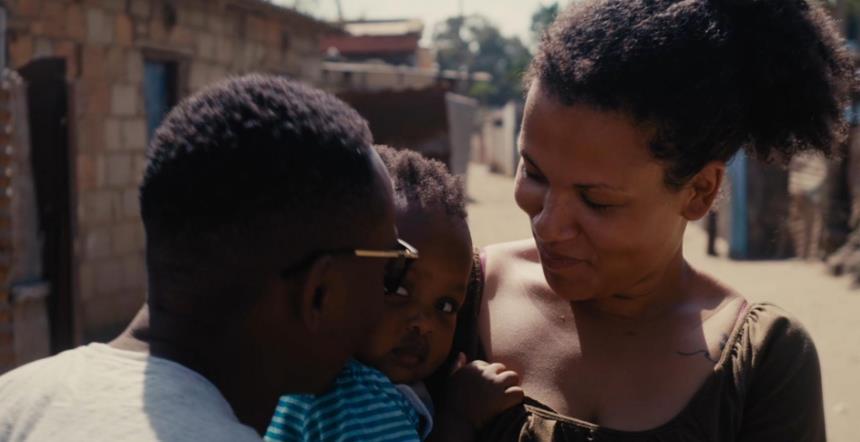

A bittersweet, heartfelt debut feature from director Brenda Akele Jorde, The Homes We Carry explores a little known chapter in Cold War geopolitical history. Using a single pan generational family story as a lens, Jorde examines the lingering aftershocks of Communist East Germany’s dubious track record of recruiting migrant workers from socialist friendly African
“brother countries” to work as cheap labour. After the fall of the Berlin Wall, in the economic turbulence that followed German reunification, most of these foreign workers were suddenly surplus to requirement and unceremoniously sent home. Adding extra emotional drama to this sociopolitical history lesson, many visiting Africans had fallen in love with German women and
World premiering at Dok Leipzig festival this week, Jorde’s film is not just about politics and economics, but also the psychological and cultural damage that these forces can inflict on families and on society as a whole. As an Afro German herself, the director is interested in representation and identity, in degrees of blackness and different kinds of belonging. She probes these questions obliquely in a observational manner that never feels dry or didactic, always placing the personal before the political, and letting the overlap between the two speak for itself. An elegant lesson in empathy and light touch storytelling, The Homes We Carry should draw plenty more festival offers after Leipzig, while its timely themes and tender tone will boost its chances for specialist art house, TV and streaming slots.




VERDICT: The life and work of German palaeontologist Johannes Weigelt is itself placed under the microscope in this inventive and unexpectedly charged miniature portrait.
Ben Nicholson, October 18, 2022




One might not expect a short documentary about the life and work of a palaeontologist Johannes Weigelt, who pioneered the study of the fossilisation process in the 1920s, to be especially pulsating.
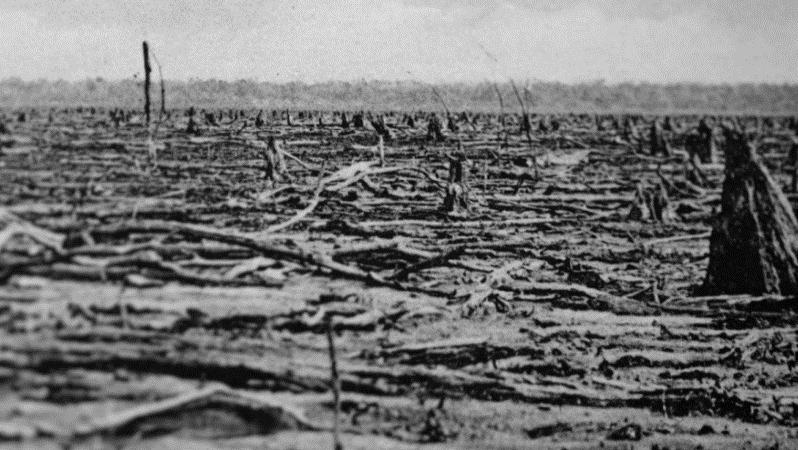
Indeed, the title of Ana Maria Gomez Lopez’s On Taphonomy which refers to the process by which living organisms transition into the earth arguably suggests the opposite. Still, through an interesting tripartite visual language, some impressive sound design from Mayvand Kasem Dad, and a fascinating act of cinematic archaeology, this unconventional diminutive biopic feels nothing less than vital.
The latter part of that verve comes in the form of a box of artefacts, uncovered in the archives of The Geiseltalmuseum, which was founded by Weigelt in 1934. Inside the box are various snapshots and documents that prove Weigelt’s quite significant affiliation with Hermann Goring and the Nazis during WWII. This is material enough to inspire a compelling character study but amongst these damning documents were a series of more than forty Dada esque photomontages a subversive artform often adopted by opponents of the regime which Weigelt, it is presumed, created at around the same time. It’s a surreal twist, difficult to quite wrap your head around.
Prior to this revelation, the film takes a slightly more traditional biographical approach, detailing its subject’s scouring of landscapes in the Americas and Europe for decomposing animal corpses. Full Review
apolitical mother in the Vogtland region, he was taken away by welfare officers at the age of 11 when it was deemed that his outspoken mother was incapable of raising a sufficiently “socialist personality.” Alex’s childhood was spent in institutions, and his reluctance to stay in them saw him do two punishing stretches in the notorious Closed Juvenile Detention Centre, Torgau.
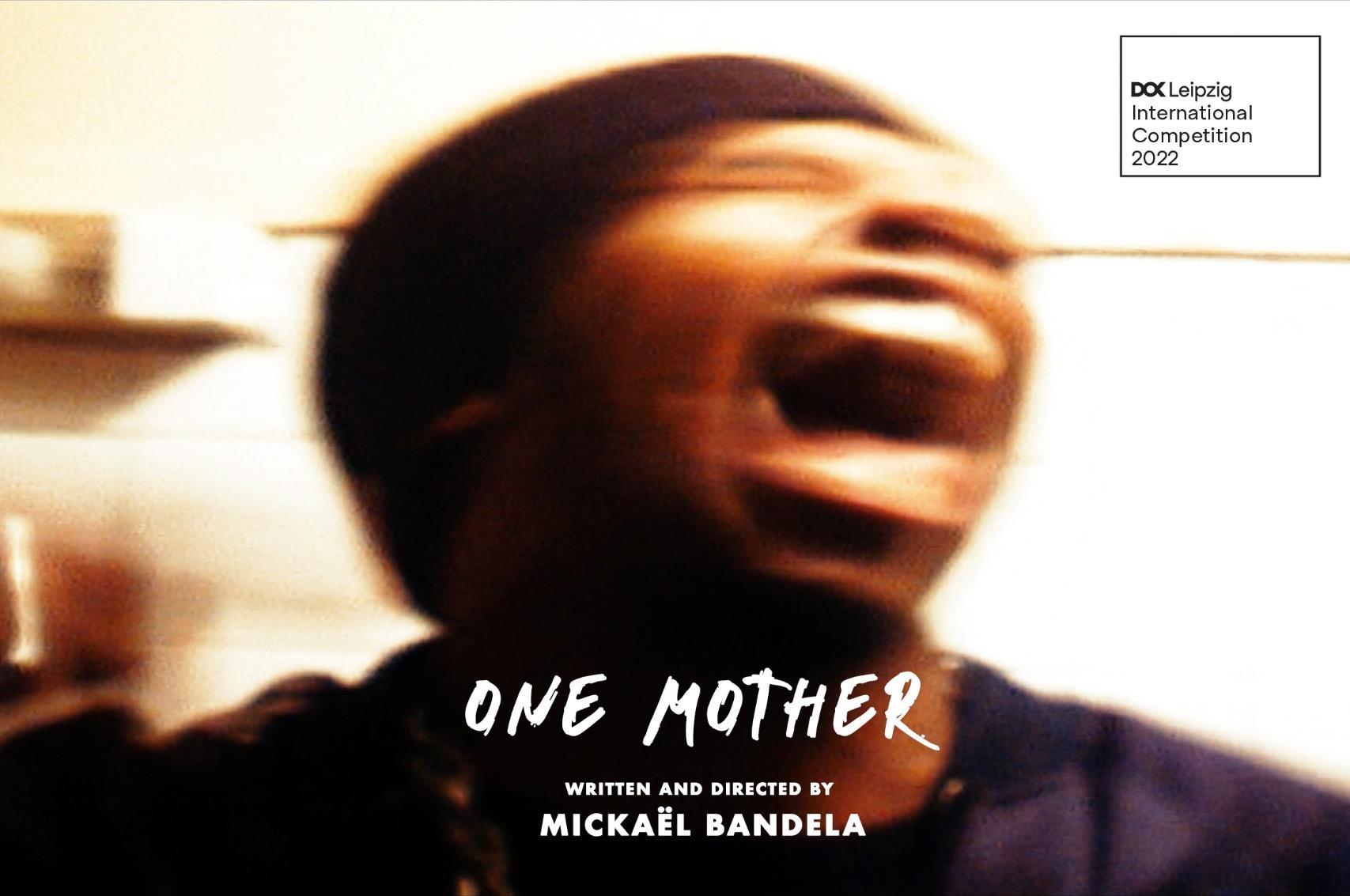





VERDICT: This atmospheric animated documentary uses collage and fleeting rotoscoped drawings to convey the brutality and dislocating effect of state care in the GDR. Ben Nicholson, October 18, 2022
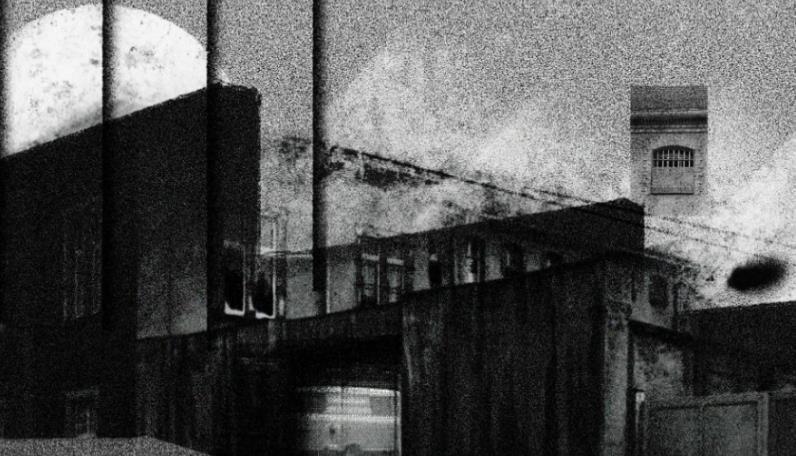
Alexander Muller’s early life, as it is sketched in Falk Schuster and Mike Plitt’s minimalist animated documentary Make or Break was forged by several years in the children’s home system of the German Democratic Republic (GDR). Originally raised by his
Alex’s experience is conveyed literally through voiceover and several intertitles that move his timeline along. It is in the visual accompaniment to the details of his story that Schuster and Plitt’s film becomes so evocative. Each location in Alex’s youth his home with his mother, the first institution he spent time in, Torgau is represented on screen by a beautifully constructed environment that combines coloured fields, pastel shading, collaged photo elements, and line drawn details. Hard lines and coloured blocks give these spaces architectural shape, and a fragment of a photo will line the wall with a bookcase or, in the more ominous locales, place barred windows in the background. Full Review

Thu, 20 October, 16:30 – 18:000 (UTC+2)
“I’ve been digesting the disappearance of Yugoslavia for 25 years”, says Mila Turajlić. In her films she does this by questioning the contemporary and film history of her country, but also of her own family. In her Masterclass, she discusses strategies of artistic research in filmmaking and her fascination with archives.
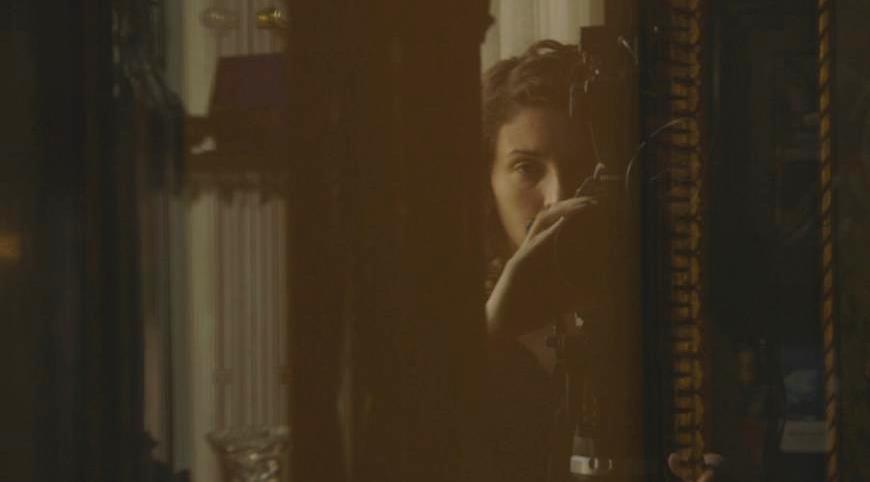
Fri, 21 October, 11:00, Polnisches Institut
Documentary films often oscillate between fact based historiography and personal directing style. They find their material, among other things, in archives where they are confronted with sometimes corrupted document collections shaped by prevailing power structures. We discuss how problematic or even missing archive items can become productive.
Moderator: Borjana Gaković
Guests: Faustine Cros (Director “A Life Like Any Other”), Mickaël Bandela (Director “One Mother”), Robin Hartanto Honggare (Director “Tropic Fever”)
Get Your Pass here
Fri, 21 October, 14:00 – 15:30 (UTC+2)





Špela Čadež, world renowned animation filmmaker, has been contributing to the vitality and international recogni tion of Slovenian animation as an artist and producer for years. In this Masterclass, she gives insights into her distinctive style of eavesdropping on reality to lift stories and characters from it and create animated poetic spaces for them.
Thu, 20 October, 12:30, Polnisches Institut
Documentary films often oscillate between fact based historiography and personal directing style. They find their material, among other things, in archives where they are confronted with sometimes corrupted document collections shaped by prevailing power structures. We discuss how problematic or even missing archive items can become productive.
Moderator: Franka Sachse
Guests: Signe Baumane (director “My Love Affair with Marriage”), Ethan Barrett (director “Rosemary A.D.”), Anne Isensee (director “Intro”)
20 & 21 October are dedicated to the art and industry of animated films
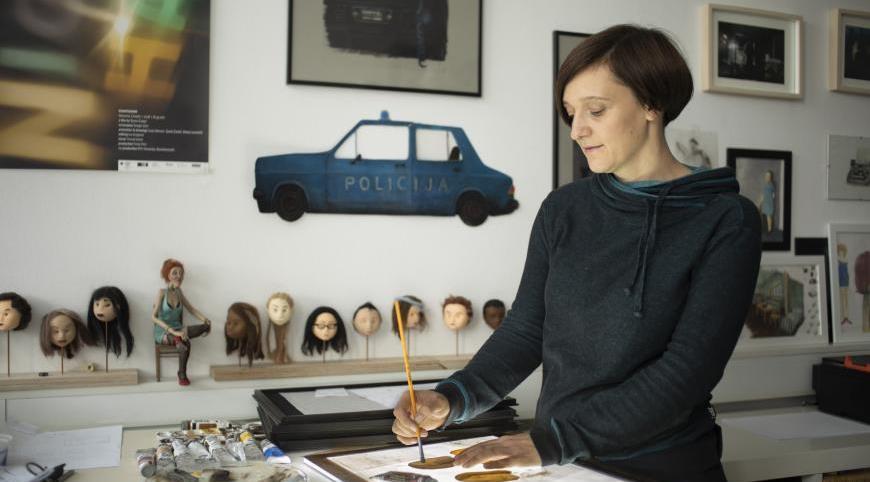
Ben Nicholson, August 14, 2022




When Ante Zlatko Stolica’s new short Babajanja begins, it feels like the tale of a bogeyman a confession about a fearsome, shadowy figure deployed by parents to make their children behave. Accompanied by purposely shot footage and archival material primarily taken from horror films, Stolica’s narration projects a ghostly presence that continues to haunt him well beyond his youth. It is just after he suggests that she stayed with him for far “longer than Baba Yaga, Freddy Kreuger and Children of the Corn,” that he reveals the reason for this is that his own personal phantom was, in fact, a real person.
It’s in the convergence of these two parts of the film that Babajanja finds its power and its poignancy. In that first half, the film flickers through familiar and unsettling flashes of horror film footage, as the voiceover paints a picture of the dark nooks and crannies of the mind, where the most frightening memories reside and are primed… Full Review
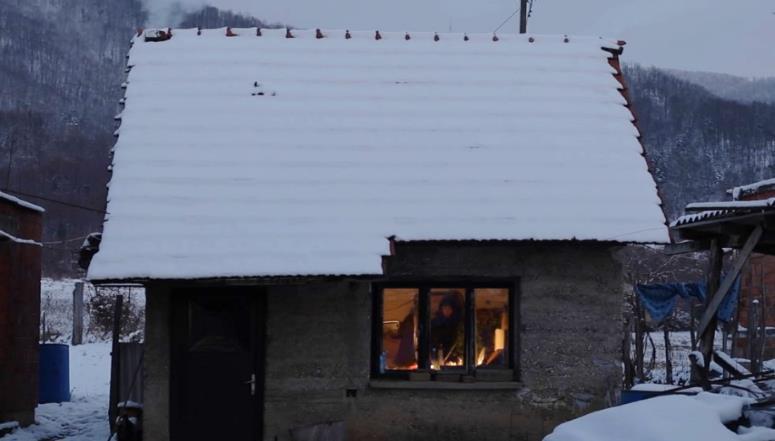

VERDICT: A father and son make daily parachute jumps from their cliffside home to sell ice in João Gonzalez’s gripping and poignant animation. Ben Nicholson, May 28, 2022


Living in a house suspended precariously from an icy cliffside, a father and son live a lonely but content life in João Gonzalez’s hand drawn animation, Ice Merchants. Each day, the two of them faces buried in chunky turtlenecks leap from their vertiginous home for an exhilarating skydive to sell their ice in the village on the ground far below. Despite featuring no dialogue, the film explores both their affectionate relationship and their shared sense of loss in a moving film that bagged the top short film prize at the Le Semaine de la Critique awards in Cannes.
The visual style is beautiful, from the use of bold, contrasting colour blocks to the way that the line drawings are able to convey the rippling effect of wind resistance as the characters plummet from their veranda cum diving board. Equally vibrant is the dance of the two hats that, during every jump, are whipped off the characters’ heads and whirl and play in the air. Full Review
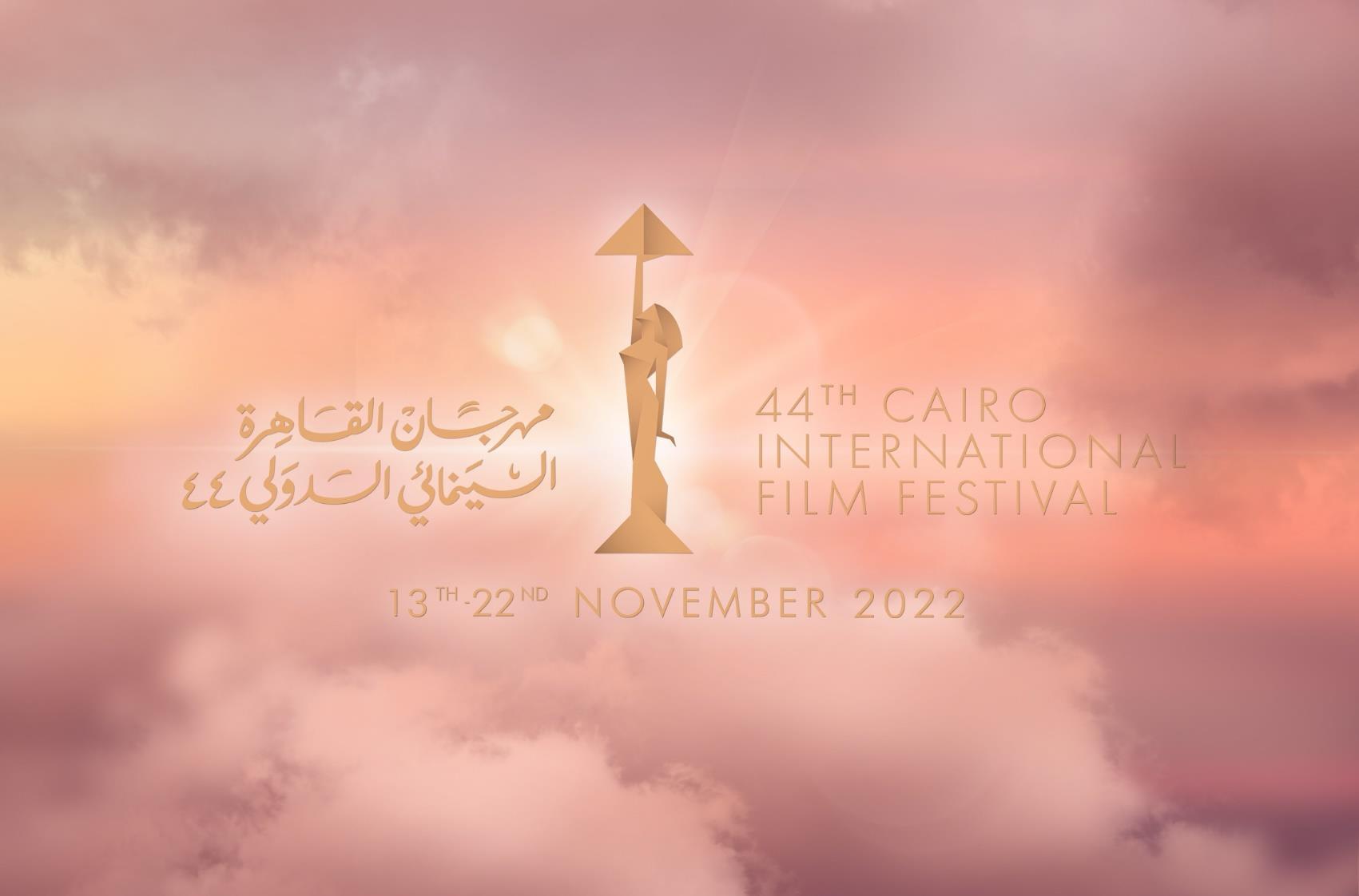




Medellín’s queer underground gets its time in the spotlight in Anhell69, a pulsating blast of queer punk populated by ghosts in more ways than one. Both a film as well as a meta film, this creation from multi hyphenate Theo Montoya, who directed, wrote, shot and co edited the work, takes as a starting point an abandoned project to make a B movie about ghosts in the past, casting his queer friends in the main roles. But youngsters in Medellín rarely last, as the film so poignantly illustrates, as a drugs pandemic and gang violence continue to take a lot of especially young lives, turning the people set to play fictional ghosts into actual ghosts that haunt both Montoya and the viewers. Clocking in at a compact 74 minutes, this should be a welcome title at queer film showcases and festivals looking for South American and more experimental work aimed at youngsters. Full Review
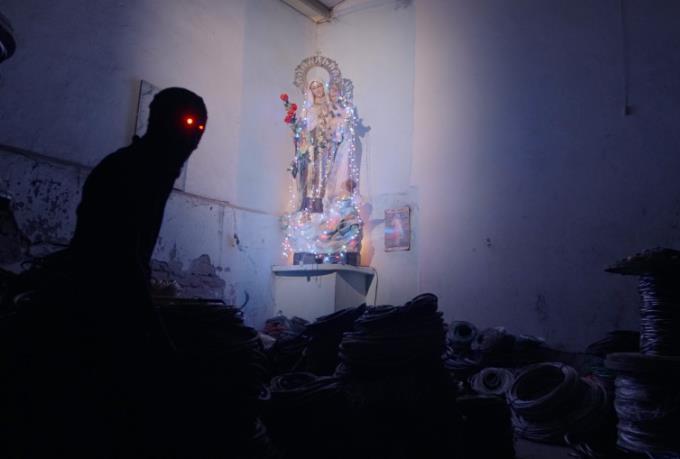

VERDICT: Debuting director Theo Montoya offers up an ambitious slice of atmospheric and resonant queer punk.
Boyd van Hoeij, September 7, 2022



impressively rich and rounded for what is essentially a one woman show.
VERDICT: Director Sofia Brockenshire assembles a rich mosaic of memories from her family's globe trotting history in this visually dazzling essay film debut. Stephen Dalton, October 19, 2022

The sense scrambling, time looping, identity blurring effects of a nomadic life are echoed in the striking visual grammar of Sofia Brockenshire’s debut feature, a highly personal essay film deeply rooted in the director’s own family history. Drawing on the diaries of her father Neil, who spent 30 years travelling the globe as a

Canadian Immigration Officer, The Dependents is a haunted memory palace of loosely connected images, archive audio clips and contemporary interview material. With Brockenshire also serving as producer, cinematographer, editor and composer, this densely layered audiovisual tapestry feels
The fuzzy narrative underlying The Dependents is a true family chronicle of international travel and multicultural mixing. But Brockenshire repeatedly reminds us how human memories can be selective and subjective, particularly when reassembled with the eye of an avant garde collage artist. World premiering at Dok Leipzig this week, The Dependents is emphatically a rarefied festival item with one foot firmly in the art gallery. Indeed, the project grew out of the director’s studies at the Art Institute of Chicago. An uncharitable viewer could well dismiss it as a self indulgent exercise in style over content. But it is also a superbly crafted exercise in visual mosaic, vibrant and musical, loaded with eye catching techniques that this inventive young director could fruitfully apply to future films.
Full Review




VERDICT: A searching and honest recalibration of one family’s narrative, as the director reinterprets her father’s obsessive home movies from her mother’s perspective of domestic unfulfillment.
Carmen Gray, October 19, 2022



“I film life because I love life, I don’t want it to slip away,” says the father of Faustine Cros, explaining his near obsessive creation of home movies in her documentary A Life Like Any Other. He claims he wanted to be able to later show his wife how beautiful their family years were. Nostalgia has always been commonly associated with such image making. But when Cros revisits this personal archive, she unearths a very different story from the one her father intended, staging an act of feminist retrieval as she validates instead the perspective of her mother, who experienced domesticity as profoundly unfulfilling.
Faustine’s mother, Valerie, attempted suicide in recent years by swallowing pills, and the director approaches the footage almost as evidence, to determine when Valerie’s life began heading toward that point. Piecing episodes together, she reveals a woman who feels desperately trapped by parenting’s demands, curtailed career success and the banality of household chores. World premiering at Dok Liepzig this week. this quiet but intensely personal and perceptive work ventures into taboo territory in challenging traditional conceptions of motherhood and gender roles, and should find appreciative slots in festivals with space for smaller gems of creative documentary. It contributes to a strain of new feminist cinema about women who do not consider raising children their ultimate role in life, or nurturing as their defining trait. Full Review


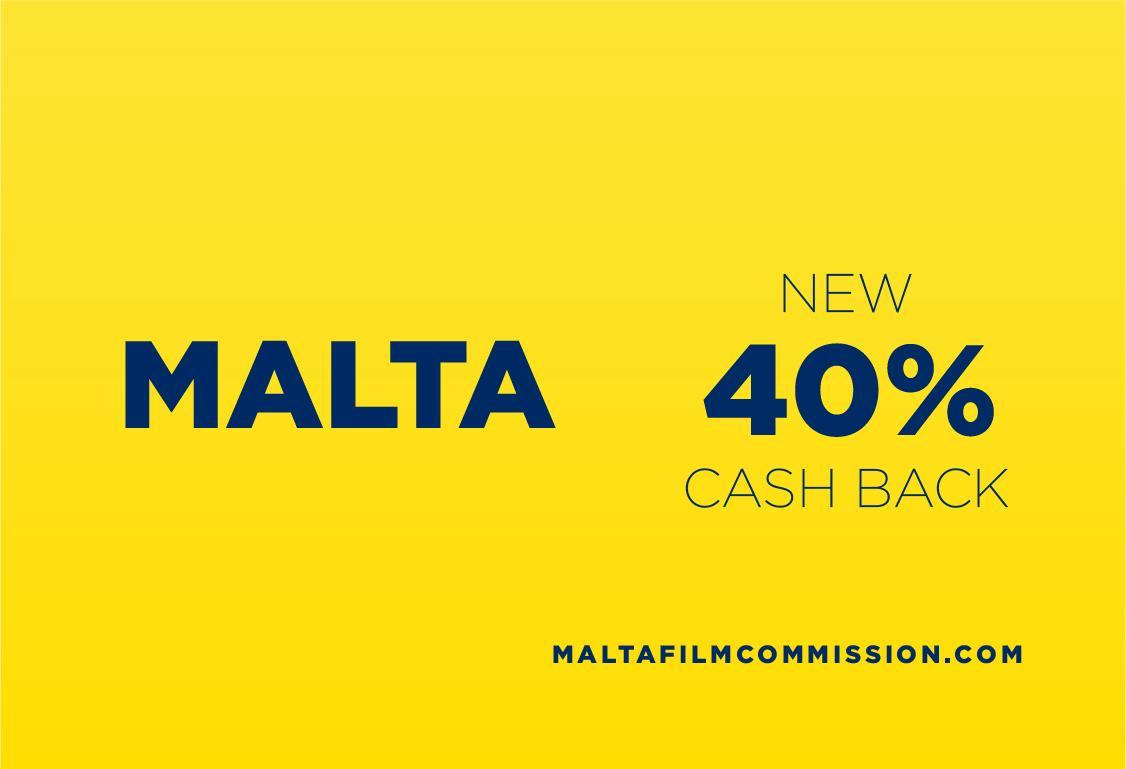
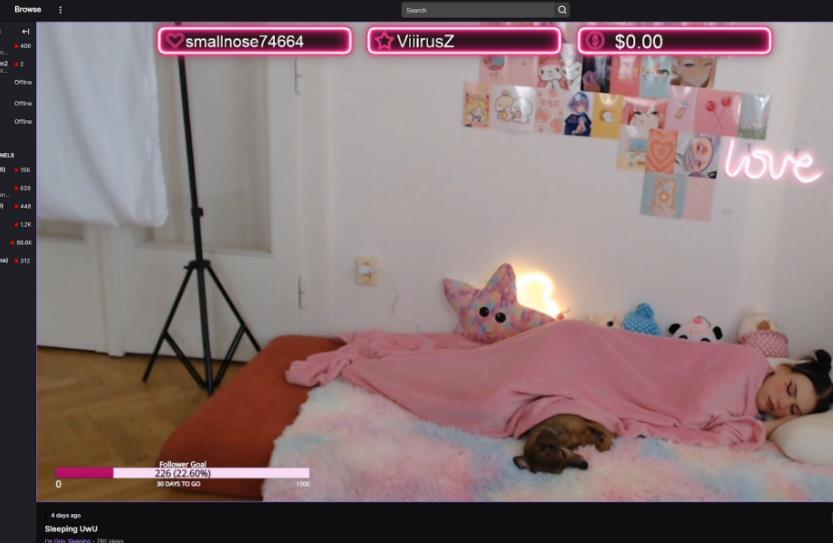





In 2018, an internet user known only by his on screen alias, Anathematic Anarchist, posted a suicide note on an incel forum on Reddit. Coming across the post, filmmaker Gala Hernandez Lopez decided to go in search of the other vestiges of this persona that she could find online, deeply hoping that the note had not preceded an actual suicide and that Anathematic found the strength to overcome his despair. That search forms the narrative backbone of the short essayistic documentary The Mechanics of Fluids through which she finds herself navigating some of the web’s less than savoury corners in an attempt to understand how loneliness operates and perhaps is exacerbated in – a hyperconnected world.
As the term incel has become more ubiquitous and understood over the past few years, it has tended to arise in popular culture more as a shorthand, either in the service of snappy, derogatory characterisation or a targeted punchline. Full Review
VERDICT: Gala Hernandez Lopez’s essay film addresses the incel phenomena from a position of fascination and empathy, seeking to understand the pain of isolation in a connected world.
Ben Nicholson, October 19, 2022
VERDICT: The past is a foreign country full of shadowy horrors in Serbian director Nataša Urban's prize winning documentary about unreliable memory and collective amnesia.
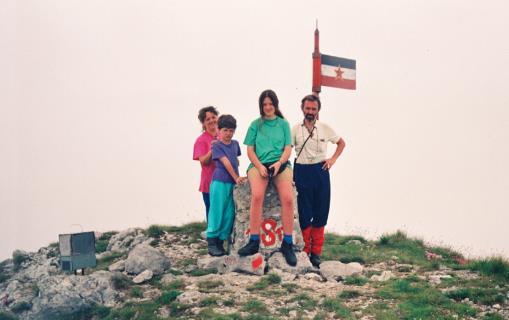
Stephen Dalton, August 18, 2022



An absorbing and imaginative feature length debut from Serbia born, Norway based documentary maker Nataša Urban, The Eclipse revisits the Balkan wars of the 1990s through a highly personal lens, foregrounding the memories of the director’s family and friends from this tragic era, with the horrors of war mostly occurring off screen. Making the inspired formal decision to use excepts from her father Borislav’s meticulously detailed hiking diaries as a loose narrative spine, Urban finds moments of pastoral beauty and uplifting humanism in these shared recollections, but also buried trauma and troubling evasions too. Following its prize winning premiere at CPH:DOX in April, this multi layered memory palace is screening at Sarajevo Film Festival this week, which feels like a homecoming of sorts. More festival play is assured, while broadcasters and art house platforms should also show interest.
Review


designated as the Prelude. “But basic survival is just one part of life,” says our narrator.


VERDICT: Signe Baumane's animated feature is so brilliant in presenting a female perspective on love and marriage that you forgive its need to tell us the science behind romance.
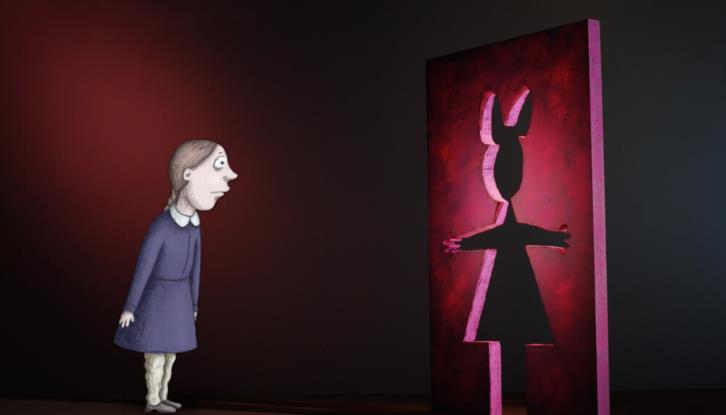
Oris Aigbokhaevbolo, July 11, 2022



There’s a chemical and biological basis for the creation of Zelma, provided by an off screen narrator in My Love Affair With Marriage. Zelma is a cartoon character restless when we first meet her. She runs, she climbs a tree, she feeds an animal. She knows enough about life in this section of the film, which is
We go with her to Riga where she goes to school. She gets attacked by a boy and she fights back. “She’s not a girl, she fights,” says one classmate. The others join in. She falls for a boy but is ignored. Maybe because she’s not lady like? This narrative’s pattern is reinforced by a selection of songs that reminds us boys hate to feel small when it’s caused by girls. It’s not Disney because Disney deploys smoother characters. The sentimentality here is also edgier; plus, it’ll be a newsworthy day when the words hymen and vagina get into the Disney corpus, as happens in a single sentence here.
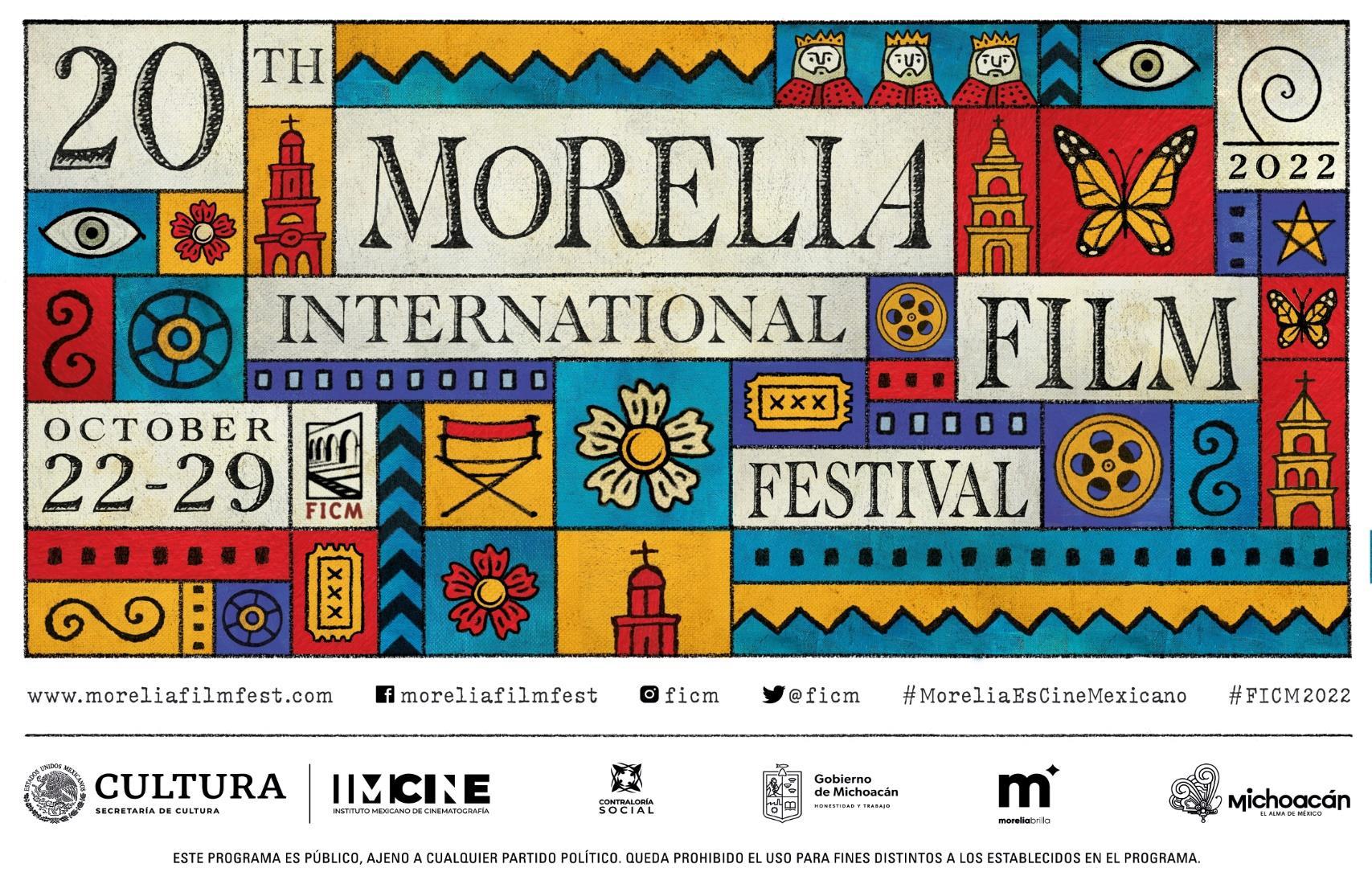
We follow her at several ages; the most eventful stage of her early life happens when she’s 17.
Increasingly reckless, she heads to a gallery where she meets an older artist. She’s hopeful that he would get her into the world of art: “He would initiate me into the esoteric knowledge of art,” she says. But it is sex and abandonment that she gets from the old man. More affairs with men will follow. Full Review



In 2018, an internet user known only by his on screen alias, Anathematic Anarchist, posted a suicide note on an incel forum on Reddit. Coming across the post, filmmaker Gala Hernandez Lopez decided to go in search of the other vestiges of this persona that she could find online, deeply hoping that the note had not preceded an actual suicide and that Anathematic found the strength to overcome his despair. That search forms the narrative backbone of the short essayistic documentary The Mechanics of Fluids through which she finds herself navigating some of the web’s less than savoury corners in an attempt to understand how loneliness operates and perhaps is exacerbated in a hyperconnected world.
As the term incel has become more ubiquitous and understood over the past few years, it has tended to arise in popular culture more as a shorthand, either in the service of snappy, derogatory characterisation or a targeted


VERDICT: An offbeat, multi layered “documentary fairytale” in which a film crew help a bi gender ornithologist enact Twin Peaks inspired fantasies in the woods outside Moscow. Carmen Gray, October 20, 2022
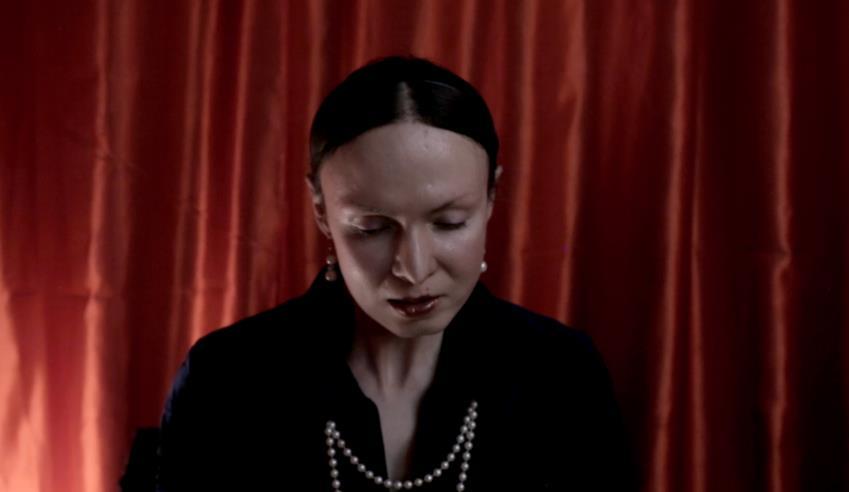

punchline. What is perhaps most immediately striking about Hernandez Lopez’s film is the thoughtfulness with which she treats this subculture which, via her narration, she suggests she originally thought she may find some solace in as someone who was, herself, involuntarily single. Of course, what she finds in her search is an underworld often
defined by a “corrosive, acidic hatred” of women that often goes hand in hand with a genuine threat of real world violence. Far from just dismissing it, she searches for its causes finding a parallel to the overwhelming pressure of social isolation in the spasming explosive rage of Joaquin Phoenix in The Joker Full Review





and festival prizes with Cinema Komunisto (2011) and the more personal The Other Side of Everything (2017), Turajlic returns to raid her former homeland’s cinematic vaults again with her latest project, Cine Guerrillas: Scenes from the Labudovic Reels, which illuminates a little known connection between Cold War Yugoslavia and Algeria’s anti colonial liberation struggle.
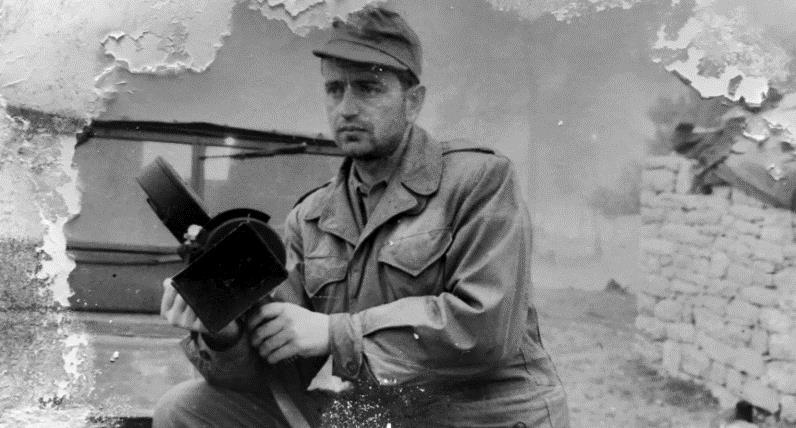
VERDICT: Prize winning director Mila Turajlic unearths a fascinating lost chapter in Cold War history in this archive heavy documentary.
Stephen Dalton, October 20, 2022
Serbian documentary maker Mila Turajlic has built a slender but impressive canon of archive driven essay films that critically interrogate the political and cultural legacy of the former Yugoslavia in a witty, humane manner that has award winning appeal to international audiences. After earning warm reviews
Making its European debut at Dok Leipzig festival this week following its Toronto world premiere last month, Ciné Guerrillas is a more urgent and timely film than its cumbersome title and slow paced opening may initially suggest. This is not just a local interest story from the dusty back pages of history, but a nuanced examination of national myth making and cultural propaganda that speaks to our current climate of fake news and growing state censorship. Turajlic’s prize winning track record and lucid treatment of complex material will open more festival doors, although specialist art house platforms, academics and Cold War history buffs are likely to be her niche audience. Full Review
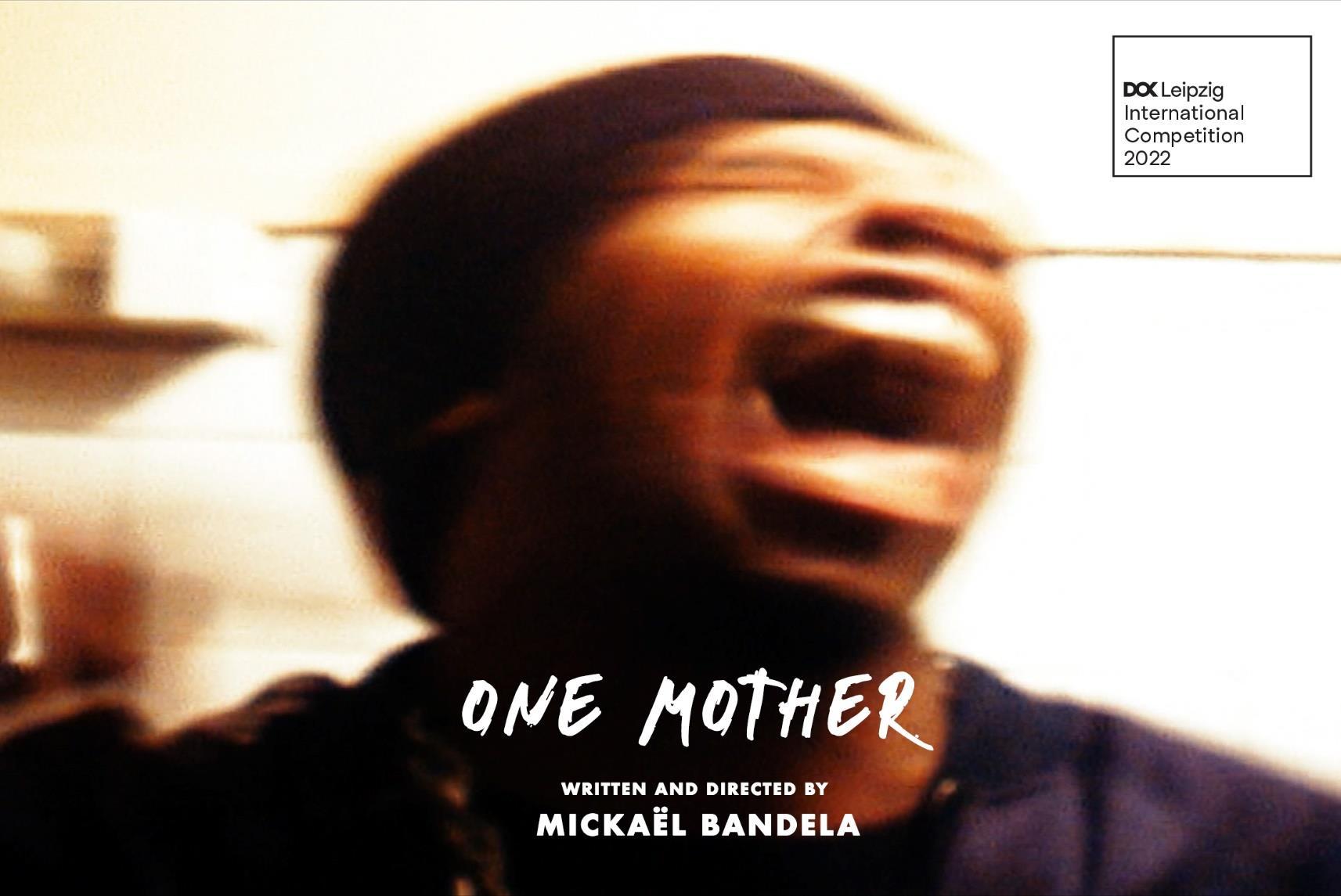





VERDICT: Life is seen through the eyes of a mysterious creature living beneath the soil in this curious but at times unsettling underground animation from Jeffrey Zablotny. Ben Nicholson, October 20, 2022
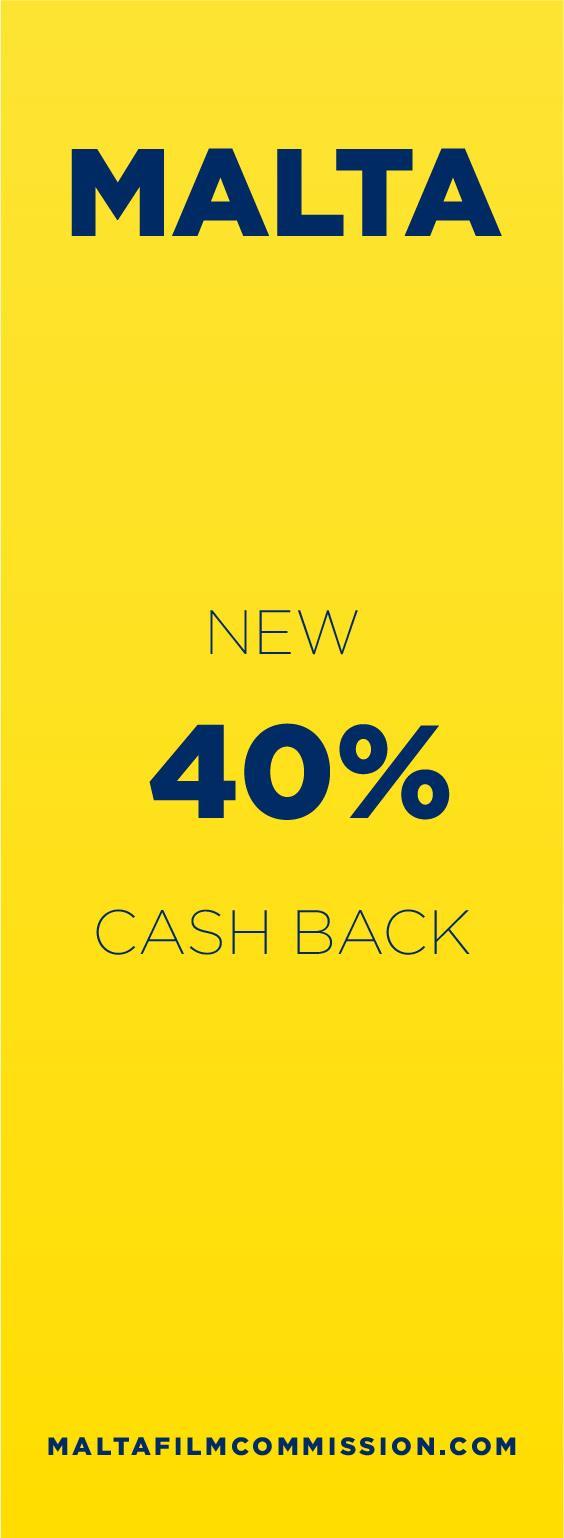
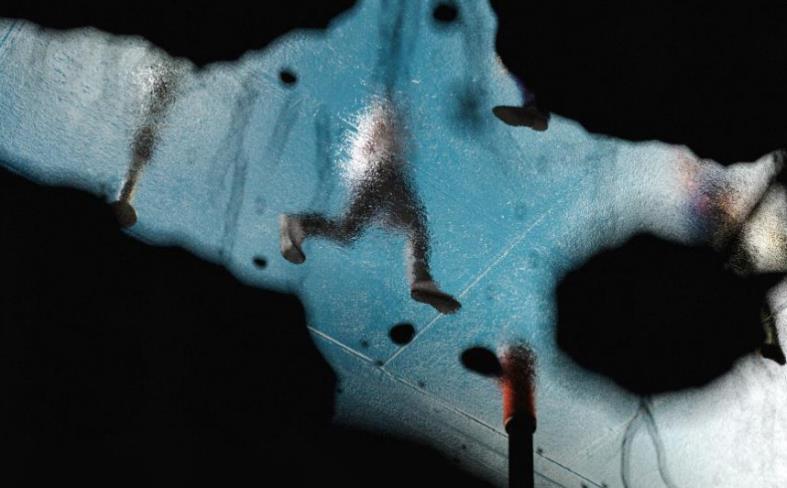
Jeffrey Zablotny’s creeping animation Sub Terra opens with what feels almost like a documentary depiction of a young woman in a hi vis jacket, identified in the credits as The Arborist (Anna Mernieks), examining a roadside tree. She hammers a series of nails into the bark and then taps on them, using a handheld device to assess the tree’s health. As she does this, the image abruptly jumps from the live action surface world to a murky animated perspective, looking up at the soles of the tree surgeon’s feet. This is where the action remains for much of the rest of the film, as we adopt the viewpoint of an unidentified creature moving through a surreal realm beneath the earth.
The underground world that Zablotny (who directed and animated the film) and his sound designer Jana Irmert have created is one in which the planet’s crust encloses an eerily still watery void. When the camera first looks up at the arborist’s feet, it appears as though she is standing on a sheet of ice and being watched from below it, except for the murky brown colour that hints at a more recognisable soil underfoot. Zablotny’s illustrations are created using a variety of animation techniques 2D, 3D, photogrammetry, motion capture that sees the visuals occupying an uncanny elsewhere in which workmen’s tunnels, underground railroads, and sewage pipes lie in a shadowy bog. Full Review
From the opening moments of Éric Baudelaire’s new mid length film, When There Is No More Music To Write, and other Roman Stories, it is clear that we are situated during the Years of Lead. A period of political and social unrest which engulfed Italy from the late 60s to the early 80s, it is the backdrop against which musician Alvin Curran’s time in Rome is defined. Baudelaire’s film takes different elements of Curran’s experience, his work, and his philosophy to craft this abstracted but seductive portrait of the artist. Made in collaboration with Curran and music historian Maxime Guitton, it is a single channel triptych that will also go on to become three moving image works within a joint exhibition by the three titled When There Is No More Music To Write

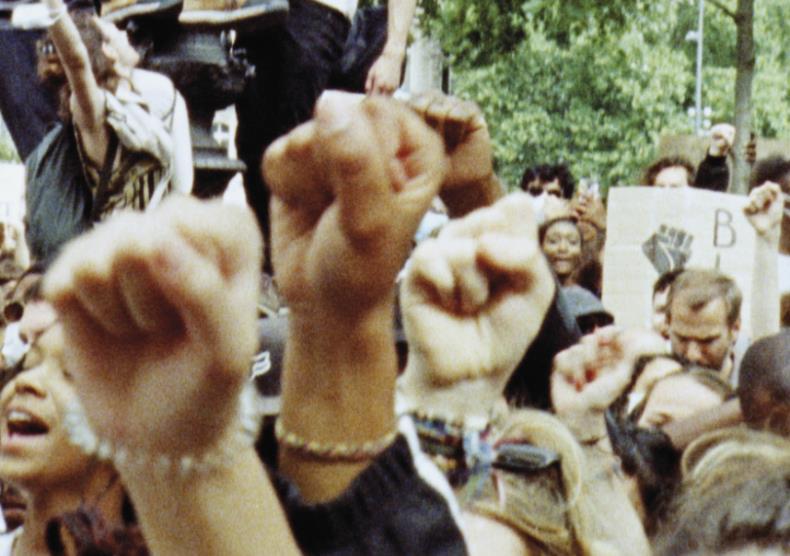
The first of the three films that comprise the overall work, Four Flat Tires, is the most explicitly about the political situation. It takes as its starting point a little known aside in the otherwise infamous story of the kidnapping of Aldo Moro, the former Italian prime minister, in March 1978. Full Review
VERDICT: Éric Baudelaire riffs on the music and musical sensibility of Alvin Curran in this absorbing archival documentary about the revolutionary fervour of mid century Rome.
Ben Nicholson, April 4, 2022





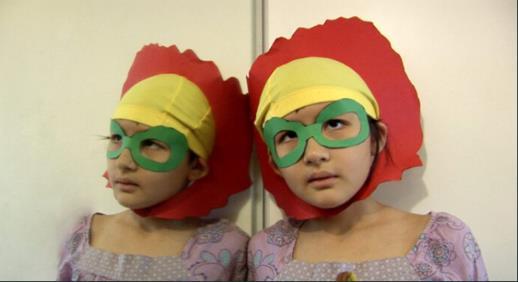
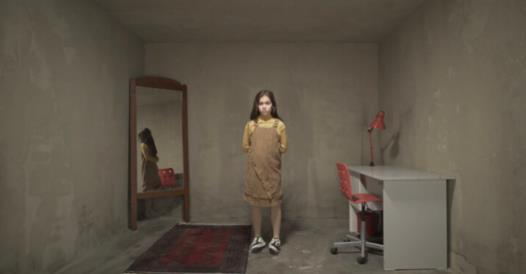
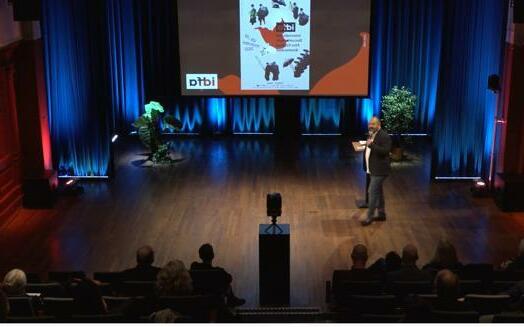

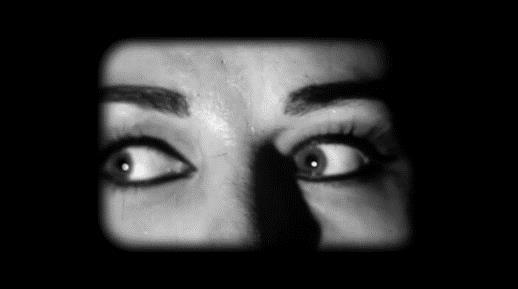

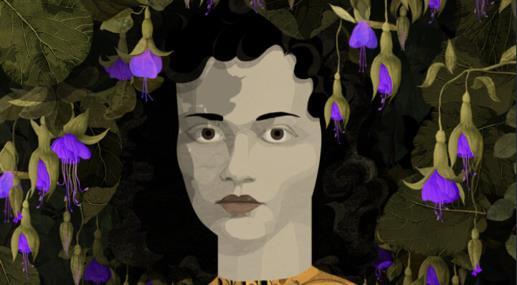

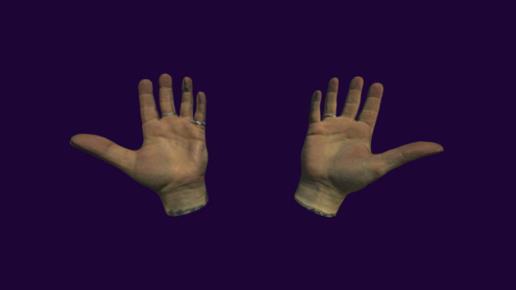
the festival and will be given by the Mallorca Film Commission, as announced by Councillor for Tourism and Sport Andreu Serra This year’s award will go to the German actress Natassja Kinski who has worked in films such as Paris, Texas, Tess and Cat People.
Mallorca Film Festival runs Oct. 26 Nov. 1, 2022

Location EXPO at AFM will welcome Film Commissions, Government Agencies and Production Service Companies from more than 30 countries.
Organizations participating in LocationEXPO hail from the U.S. and as far as Egypt, Kauai, Malaysia, Malta, Sao Paolo, Thailand, and Tokyo.
In addition to connecting with Film Commissions and organizations, who collectively are offering millions of dollars in production incentives AFM participants can also attend panels and presentations from LocationEXPO exhibitors and partners.
The current schedule and speakers can be viewed HERE




AFM runs Nov. 1 6, 2022


Nikolaus Geyrhalter’s latest exquisitely composed opus looks at the global garbage crisis, from Maldive palm groves strewn with plastic to festering landfills, encompassing community rubbish collections and recycling plants in a cinema essay style whose noninterventionist approach caters to audiences already committed to the cause.
Jay Weissberg, August 10, 2022
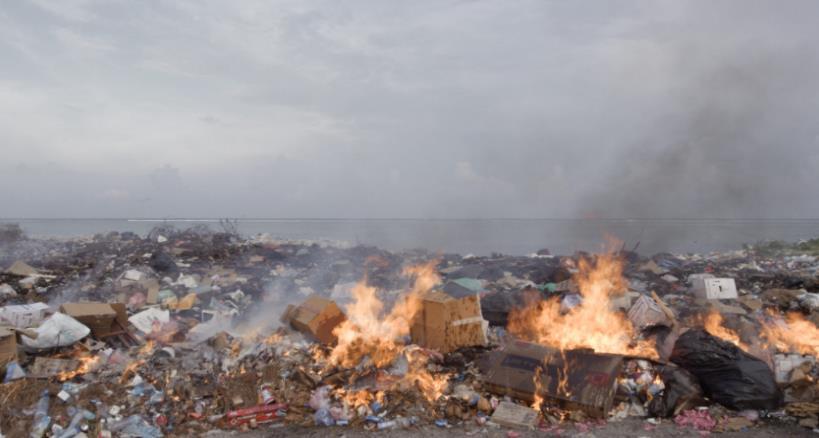


Following Nikolaus Geyrhalter’s award winning ecological alarm bells documentary Earth, it makes sense he’d turn his patient, exquisitely composed attentions to the global rubbish emergency. Matter Out of Place (aka MOOP, a term denoting any detritus not native to its immediate environment) wends its way across continents, from Switzerland to the Maldives, Nevada to Nepal, registering in neutral, noninterventionist images the deeply disquieting ubiquity of trash in places most of us would think were pristine. Streams draped with ghostly plastics and ocean beds encrusted with waste give way to community clean ups and recycling plants; Geyrhalter’s style is to present these scenes without commentary, allowing the power of the images themselves together with fine editing and superb sound to convey a message we all know yet tend to push aside. As with his previous documentaries (including The Border Fence and Our Daily Bread), the Austrian director’s latest is likely to find a warm welcome at festivals worldwide.


The first shot is of a stunning narrow lake high up in the Alps, nestled between snow dusted mountains and appearing to be purity incarnate. That notion is exploded with the next shot, of the shoreline choked with plastics, an especially shocking image given that there’s no habitation in sight. Full Review







VERDICT: French director Mickaël Bandela reassembles his broken family history into a multi media memory mixtape in this messy but stylish bio documentary. Stephen Dalton, October 21, 2022
A young French film maker of African heritage tries to make sense of his tangled, troubled family history in One Mother. Mickaël Bandela’s autobiographical bio documentary is assembled in an overloaded, densely layered, non linear collage style that works against narrative clarity at times, yet still manages to deliver visual
beauty and emotional bite. Screening at Dok Leipzig this week, this unorthodox public exercise in cathartic family therapy should gain more festival traction with its oblique, highly personal angles on immigration and foster care issues. The lightly experimental style will mean limited theatrical prospects, but could have art world crossover appeal.
Bandela’s birth mother Gisèle, a Congolese immigrant to France who features heavily in the documentary, handed him over to a foster family at the age of six months. This is not quite the primal emotional wound it might have been in a more conventional story than this, since the two have always stayed in touch and evidently still share a complex, spiky but mostly loving bond. Another central presence here is the director’s foster mother Marie Thérèse, a warm and wryly humorous matriarch who welcomed him into a large French African family in Normandy. Here he seems to have outwardly thrived while concealing darker feelings of abandonment, displacement and alienation.
In his twenties, Bandela heads for southern France, apparently adrift and penniless, though the thinly explained clips from this period depict a lifestyle of sunny hedonism, swimming pools and embryonic film making experiments. Full Review
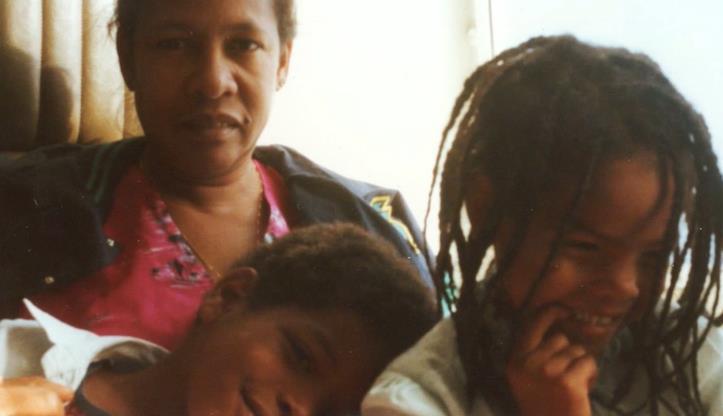
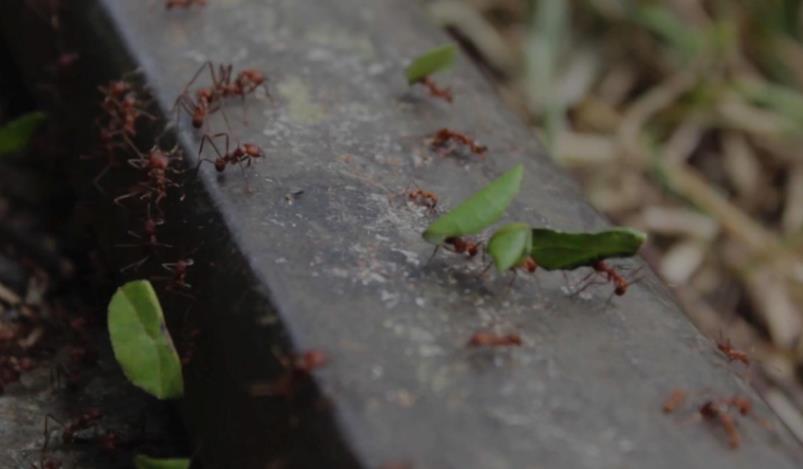
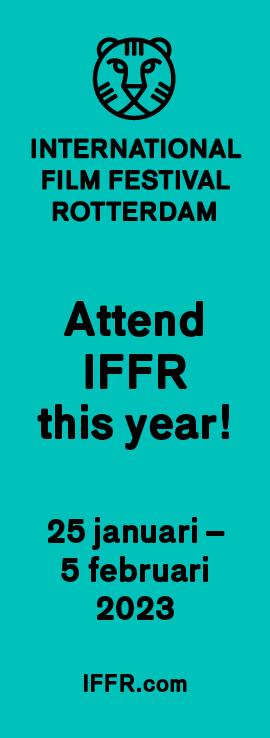



VERDICT: This observational documentary follows the travails of a female driver who is part a grass roots public transit system connecting the villages of northern Colombia.
Ben Nicholson, October 21, 2022


Alba Jaramillo’s compelling documentary Motorrodillo is named for a homespun mode of transport that emerged from the communities of northern Colombia when the railway system abandoned the area. Something like an amalgamation of a handcar and a passenger carriage, powered by an affixed motorbike, the motorrodillo uses the deserted tracks of the railroad to ferry passengers and goods from village to village, via the dense and lush forests. Focusing primarily on a single driver, Dolly, this affecting film follows her travels through the local landscape, also taking note of the way she must as the sole female driver navigate her professional environment, not least when local officials begin proceedings to legally recognise this previously off the books and grass roots system.
The opening shots of Motorrodillo recall the visuals of the ‘phantom ride’ attractions that were prevalent in early cinema, a camera mounted on the front of a train would transmit the experience of rushing along the tracks. It’s a thrilling motif that recurs throughout the film, placing the audience in the position of a passenger hurtling through the jungle. It may seem a surprising reference point given the now antique nature of the ‘phantom ride.’ However, there is something strangely fitting about the use of this familiar composition to convey the essence of these abandoned ferroequine pathways now recolonised by communities. Full Review
this week at Dok Leipzig as part of a selection of films shortlisted for the upcoming Doc Alliance awards. Already a fest blessed favourite, its light hearted treatment of heavy subject matter feels well suited to attract keen interest from big and small screen platforms. Canal Plus Poland and the Polish Film Institute are already on board as backers.
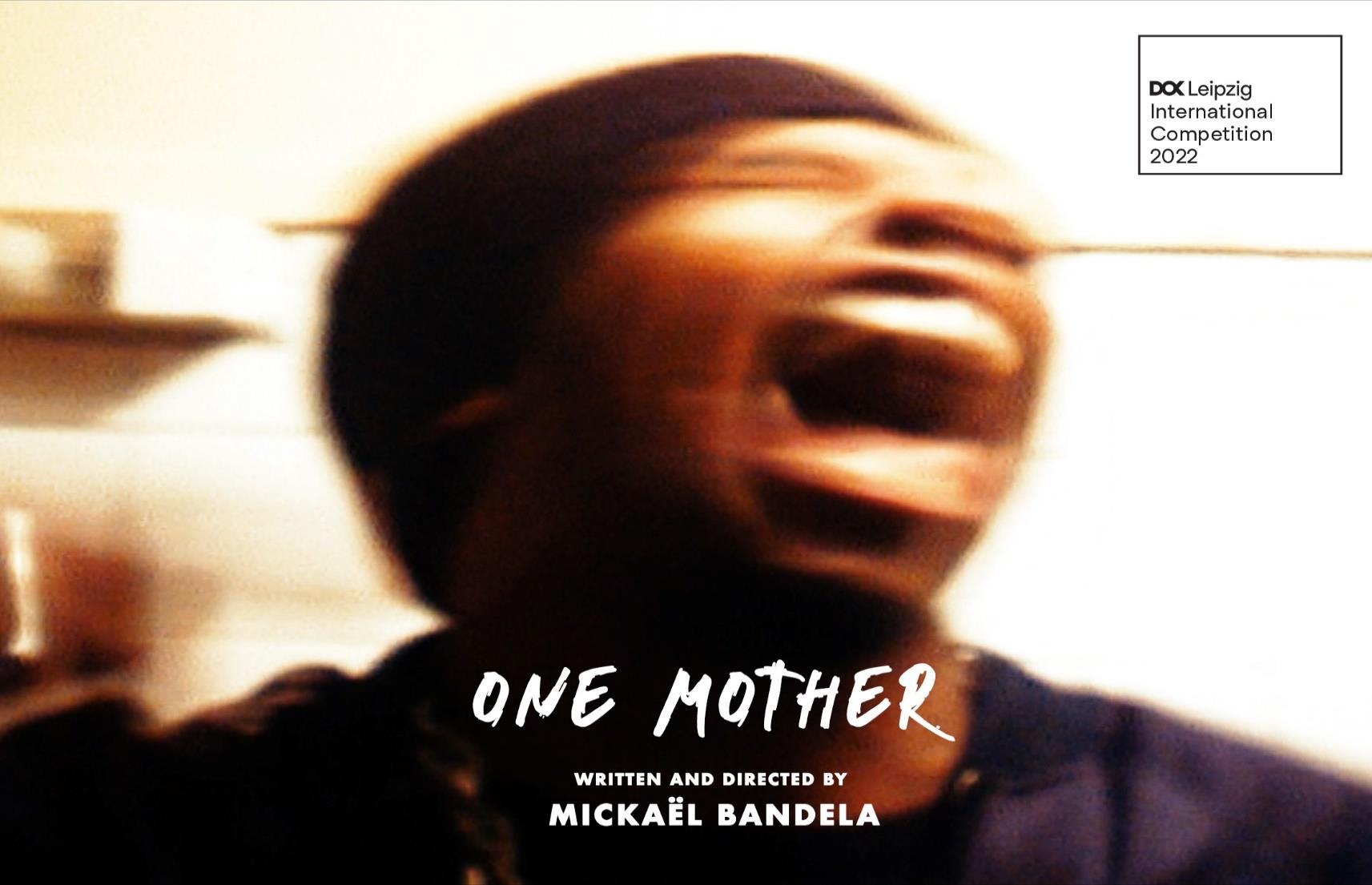




VERDICT: Polish director Lukasz Kowalski celebrates a different kind of pawn star in his prize winning docu comedy debut. Stephen Dalton, October 21, 2022

A vast junk filled warehouse in one of Poland’s poorest cities may sound like an unlikely location for a fun docu comedy, but first time feature director Lukasz Kowalski manages to unearth plenty of glum levity and deadpan humour in The Pawnshop, behind the mountains of used electrical goods, second hand wedding dresses and broken down dreams. Currently in the middle of a prize winning festival run, Kowalski’s bittersweet observational gem screens
Billing itself as the largest pawnshop in Europe, the shabby megastore at the heart of Kowlalski’s film is located in a run down residential area of Bytom, a former coal mining city in the Upper Silesia region, which is sometimes called the “Polish Detroit” after suffering decades of economic decline. The boss is bullish showman Wieslaw, a penniless entrepreneur who radiates a slightly desperate belief that wealth and success lie just around the corner, like one of John Steinbeck’s “temporarily embarrassed millionaires”. The more grounded half of the management team is Wieslaw’s brassy, big hearted, peroxide haired business and life partner Jolanta, who is given to wearing fur coats in the shop, mainly because they cannot afford to heat it during the sub zero winter. Full Review
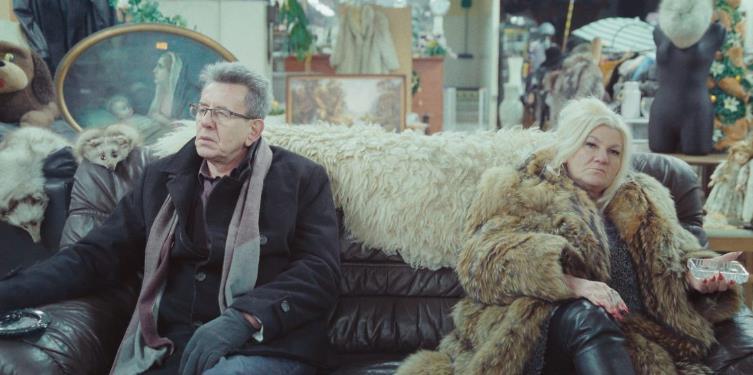

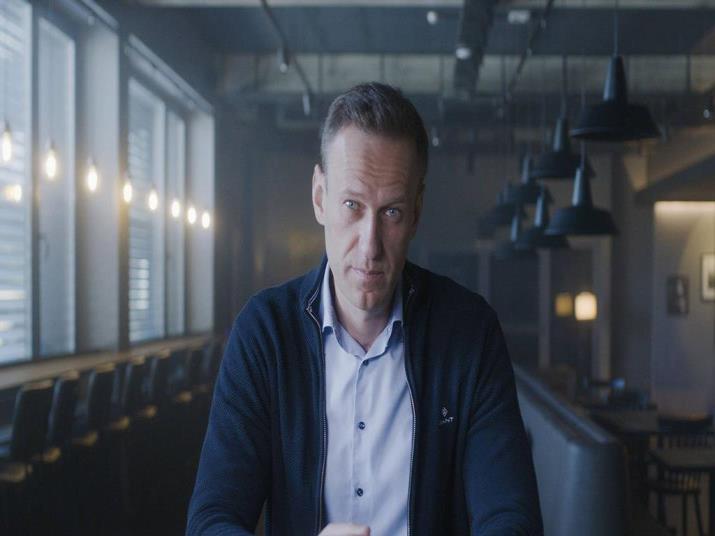
One indicator of upcoming Oscar hood (though it has not always seen eye to eye with Academy voters) is the Critics Choice Documentary Awards, part of the annual Movie Awards show presented by the American Canadian Critics Choice Association; another is the more U.S. focused festival DOC NYC Short List. Three of the films that found their way onto both nomination lists were well reviewed by The Film Verdict critics: Sara Dosa’s Fire of Love, Brett Morgen’s Moonage Daydream and Navalny Fire of Love scored the highest with seven nominations, including best documentary feature, best director and best narration by Miranda July. TFV’s critic called it “a phenomenal archive of cataclysmic imagery” imbued with the zeal of two star crossed vulcanologists. Our reviewer judged Navalny a gripping documentary that “gains extra urgency in light of Vladimir Putin’s invasion of Ukraine,” while Moonage Daydream “celebrates David Bowie’s legacy as a live performer, spiritual thinker and living work of art”.




Another film that found a nom in the Music Documentary category is Nothing Compares by Kathryn Ferguson, an engaging exploration of Sinéad O’Connor’s legacy as both icon and iconoclast. There has been substantial buzz around the documentary that took home the Golden Lion in Venice this year, Laura Poitras’ All the Beauty and the Bloodshed, which our critic called “a powerful portrait” of artist activist Artist Nan Goldin and how she held the Sackler family accountable for the opioid crisis. Goldin got noticed on both lists of nominations. It will be interesting to see if the Academy will also consider the film for the Best Picture category, as some believe it might.

American-Canadian Critic’s Choice Awards Documentary Nominations
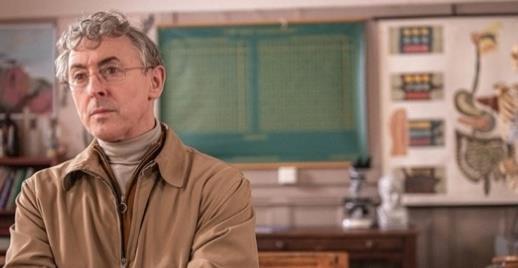
Judd Apatow, Michael Bonfiglio George Carlin’s American Dream HBO
Margaret Brown, Descendant Netflix
Sara Dosa, Fire of Love National Geographic Documentary Films/NEON
THREE MINUTES: A LENGTHENING





Alex Pritz, The Territory National Geographic Documentary Films
Aftershock Hulu
The Automat
A Slice of Pie Productions Descendant Netflix Fire of Love National Geographic Documentary Films/NEON
Reginald Hudlin, Sidney Apple TV+
Brett Morgen, Moonage Daydream HBO/NEON
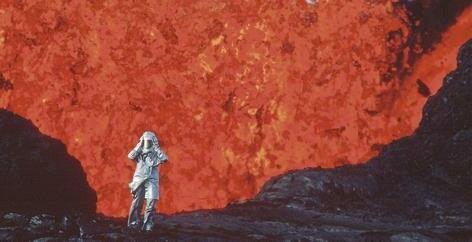

Laura Poitras, All the Beauty and the Bloodshed HBO/NEON
Daniel Roher, Navalny HBO/CNN/Warner Bros. Pictures

David Siev, Bad Axe IFC Films
Bianca Stigter, Three Minutes: A Lengthening NEON
Aftershock Hulu
All the Beauty and the Bloodshed HBO/NEON
Gabby Giffords Won’t Back Down Briarcliff Entertainment
The Janes HBO
Gabby Giffords Won’t Back Down Briarcliff Entertainment
Good Night Oppy Amazon Studios
The Janes HBO Moonage Daydream HBO/NEON Navalny HBO/CNN/Warner Bros. Pictures Sidney Apple TV+
Ryan White, Good Night Oppy Amazon Studios
Andrea Arnold, Cow IFC Films
Lisa Hurwitz, The Automat A Slice of Pie Productions

Jono McLeod, My Old School Magnolia Pictures
Amy Poehler, Lucy and Desi Amazon Studios
FIRE OF LOVE Navalny HBO/CNN/Warner Bros. Pictures
Retrograde
National Geographic Documentary Films
Freedom on Fire: Ukraine’s Fight for Freedom Netflix


